#my stuff: analysis
Explore tagged Tumblr posts
Text
Suvi and Steel are killing me. What if you loved your mother so much and it was never going to be enough to save her from the road she's been walking down since before you were born. What if she only fought so hard once she knew she could save you but it's too late for her to go back and shelter you from the world she will stop at nothing to build. You love her but you cannot follow in her sunk-cost fallacy footsteps. She loves you but she cannot close your eyes once they've been opened. The love is there and it will not save them from the pain they'll cause each other. But the love is always there.
316 notes
·
View notes
Text

slaps this baby in another "never to be polished" pile. saw that trend on tik tok and I'm experiencing a very heavy art block.
#adrien agreste#miraculous ladybug#my art#fanart#Chat Noir#this isnt an analysis or anything of the show adrien otherwise the colours wouldve been different#also thanks for the conpliments and likes and stuff! i wasnt expecting this fanon interpretation artwork to get big.#ill make one of ladybug one day for you all
2K notes
·
View notes
Text
Learning that fans hated Applejack and called her "boring" is crazyyy to me because I genuinely, unironically believe AJ's the most complex character in the main six.
Backstory-wise, she was born into a family of famers/blue collar workers who helped found the town she lives in. She grew up a habitual liar until she had the bad habit traumatized outta her. She lost both her parents and was orphaned at a young age, having to step up as her baby sister's mother figure. She's the only person in the main gang who's experienced this level of loss and grief (A Royal Problem reveals that AJ dreams about memories of being held by her parents as a baby). She moved to Manhattan to live with her wealthy family members, only to realize she'll never fit in or be accepted, even amongst her own family. The earlier seasons imply she and her family had money problems too (In The Ticket Master, AJ wants to go to the gala to earn money to buy new farm equipment and afford hip surgery for her grandma).
Personality-wise, she's a total people-pleaser/steamroller (with an occasional savior complex) who places her self worth on her independence and usefulness for other people, causing her to become a complete workaholic. In Applebuck Season, AJ stops taking care of herself because of her obsessive responsibilities for others and becomes completely dysfunctional. In Apple Family Reunion, AJ has a tearful breakdown because in she thinks she dishonored her family and tarnished her reputation as a potential leader –– an expectation and anxiety that's directly tied to her deceased parents, as shown in the episode's ending scene. In The Last Roundup, AJ abandons her family and friends out of shame because believes she failed them by not earning 1st place in a rodeo competition. She completely spirals emotionally when she isn't able to fulfill her duties toward others. Her need to be the best manifests in intense pride and competitiveness when others challenge her. And when her pride's broken, she cowers and physically hides herself.
Moreover, it's strongly implied that AJ has a deep-seated anger. The comics explore her ranting outbursts more. EQG also obviously has AJ yelling at and insulting Rarity in a jealous fit just to hurt her feelings (with a line that I could write a whole dissection on). And I'm certain I read in a post somewhere that in a Gameloft event, AJ's negative traits are listed as anger.
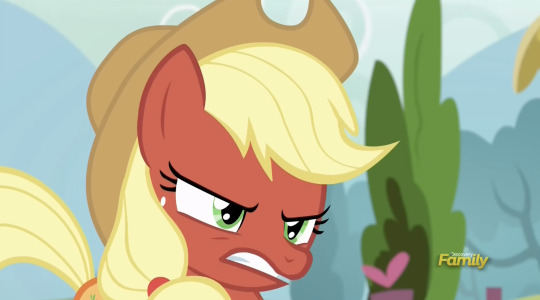
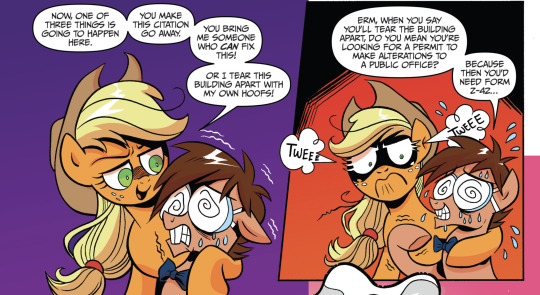
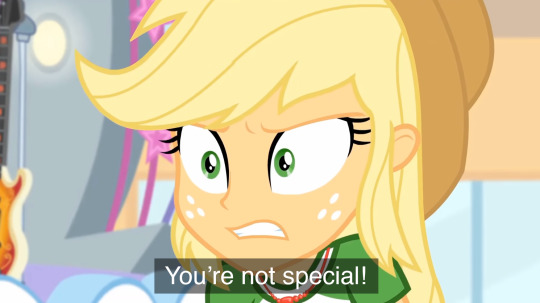
Subtextually, a lot of these flaws and anxieties can be (retroactively) linked to her parents' death, forcing her to grow up too quickly to become the adult/caregiver of the family (especially after her big brother becomes semiverbal). Notice how throughout the series, she's constantly acting as the "mom friend" of the group (despite everything, she manages to be the most emotionally mature of the bunch). Notice how AJ'll switch to a quieter, calmer tone when her friends are panicking and use soothing prompts and questions to talk them through their emotions/problems; something she'd definitely pick up while raising a child. Same with her stoicism and reluctance at crying or releasing emotions (something Pinkie explicitly points out). She also had a childhood relationship with Rara (which, if you were to give a queer reading, could easy be interpreted as her first 'aha' crush), who eventually left her life. (Interestingly enough, AJ also has an angry outburst with Rara for the same exact reasons as with EQG Rarity; jealous, upset that someone else is using and changing her). It's not hard to imagine an AJ with separation anxiety stemming from her mother and childhood friend/crush leaving. I'm also not above reading into AJ's relationship with her little sister (Y'all ever think about how AB never got to know her parents, even though she shares her father's colors and her mother's curly hair?).
AJ's stubbornness is a symptom of growing up too quickly as well. Who else to play with your baby sister when your brother goes nonverbal (not to discount Big Mac's role in raising AB)? Who else to wake up in the middle of the night to care for your crying baby sister when your grandma needs her rest? When you need to be 100% all the time for your family, you tend to become hard-stuck with a sense of moral superiority. You know what's best because you have to be your best because if you're aren't your best, then everything'll inevitably fall apart and it'll be your fault. And if you don't know what's best –– if you've been wrong the whole time –– that means you haven't been your best, which means you've failed the people who rely on you, which means you can't fulfill your role in the family/society, which makes you worthless . We've seen time and time again how this compulsive need to be right for the sake of others becomes self-destructive (Apple Family Reunion, Sound of Silence, all competitions against RD). We've seen in The Last Roundup how, when no longer at her best, AJ would rather remove herself from her community than confront them because she no longer feels of use to them.
But I guess it is kinda weird that AJ has "masculine" traits and isn't interested in men at all. It's totally justified that an aggressively straight, misogynistic male fandom would characterize her as a "boring background character." /s
At the time of writing this, it's 4:46AM.

#mlp#yeah i wrote this last night during insomnia.#yeah i know an embarrassing amount of crap about this kids show#but whatever it's my hyperfixation i'll store as much useless information as i want!!!#i'm gay and neurodivergent i have an excuse#in case you needed more proof that aj's my favorite character#personal#delete later#unless you like this analysis stuff#i get why they didn't reveal aj's parent's death until way later and why they didn't do much with it but i wish they did#cuz narratively there could've been so much material with aj's grief. like. i feel like we gloss over the fact that she lost her#mother and father as a teenager#i tried keeping my personal hcs out of this to keep it unbiased#but i'll put some in the tags#involving rarijack –– i think aj can be (but not always) very self-conscious about her relationship with rarity#anxieties that she's not the right fit or that rarity will move away and leave her some day or that another woman will take her attention#(like in rollercoaster of friendship?? nudge nudge??). basic seperation anxiety stuff#long post#regarding applebloom whenever i think about her and her parents i think about that scene in steven universe where steven looks up at#a portrait of his mother and openly wonders what kind of sack lunches she would've made for him. that episode still fucks me up
7K notes
·
View notes
Text
No one asked but here are Rafayel's dagger infos and details from different angles and approximate lengths (that i most likely calculated very poorly, do not trust me on that lol)






Apologies for the bad quality in some pics i tried my best 😔
+ I tried to figure out the details of GoT dagger as much as i could from my screenshots so take these


#i feel like i have to announce this but the last 2 drawings are done with tracing from the screenshots#cuz it was me trying to figure out stuff not doing art#but the linework still took some time so i put my watermark#love and deepspace#rafayel#god of tides#abysswalker#analysis
1K notes
·
View notes
Text
just. little things. specifically right now it’s the fact that they even managed to narratively incorporate and retroactively explain the video game Instinct To Collect. like yeah you the player collect things that sparkle when you get close because you are Playing A Game but. think about it. link, fresh out of a hundred years of sleep with near-total amnesia, instantly notices and instinctively picks up edible plants and mushrooms throughout hyrule without really knowing why. and only later do we learn that he loved to cook. he knows what is and isn’t edible and what is worth collecting instinctively because he’s used those same ingredients thousands of times before. breath of the wild you are the only game that matters ever
#guys this is bad. i’m supposed to be packing up my apartment right now#stay tuned for literally three million more posts like this#personal#zelda analysis#and stuff like this is also why totk didnt work as well for me personally. because everything felt too game-y#whereas botw was so like. seriously grounded in almost every sense.#why are we collecting shit in totk?? well because in theory someday we might want to stick it to a weapon#but that’s such a Video Game Thing To Do. yknow
576 notes
·
View notes
Text
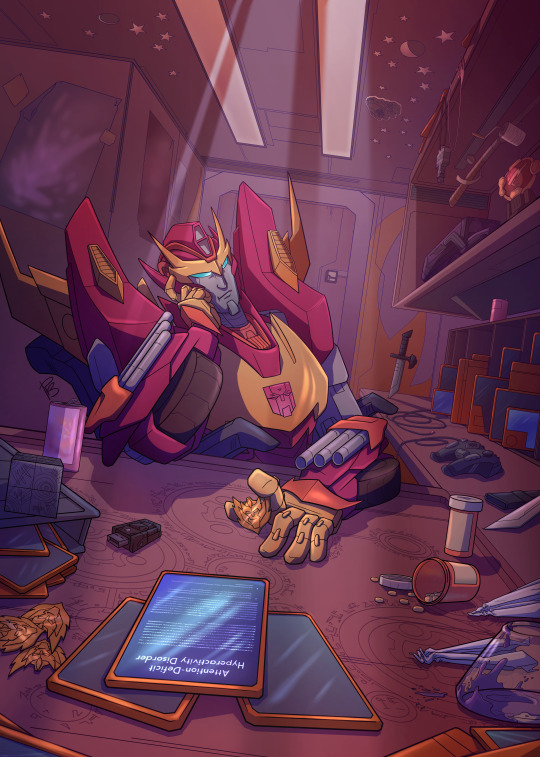
diagnosis
my piece for the Out Of Spec zine about Transformers and disabilities! the zine itself is sort of in limbo but we've been given leave to post our finished pieces. obviously i had to draw my ADHD king. i've also got this as a print, i need to put it up in my shop...
#outofspeczine#macaddam#transformers#neurodivergence#rodimus#tf idw#mtmte#zine stuff#prints#im somewhat nerfed when doing analysis of idw bc i literally cannot read him without seeing adhd written all over him#it colors my perception of everything
625 notes
·
View notes
Text
as much as I love the common "Tim worships/stalks Jason" trope in TimJay fanfiction because it's Good and making Tim a weird little freak is Fun, I think the underutilized dynamic is where Jason is the one weirdly obsessed with Tim and makes it Tim's problem.
Like, the moment Jason is confronted with the information that a third Robin exists, the first thing he does is cover his wall with pictures of Tim so he can just obsess and torture himself over it. That is the behavior of a man who is Unwell over Tim's existence and I love it.

red hood: lost days #4
And as much as a shitshow as The Titans Tower Incident™ is characterization-wise (though I think it has far more merit in depicting Jason's character than people give it credit for but I digress-) there's something very fun about the fact that even after kicking his ass, Jason respects Tim and is impressed by him.

teen titans (2003) #29
And on top of that, Jason can't seem to stop trying to ask Jason to Tim to work with him in some capacity.


robin (1993) #177



batman: battle for the cowl #2
While Battle for the Cowl is an exceptionally bad comic, especially for its characterization of Jason and the "be my Robin" bit is taken deeply out of context, I do think it's interesting how obsessed Jason is with believing that Tim is extremely competent, only held back by being "brainwashed by Bruce". (hence him leaving Tim for dead later on in the comic.) Jason seeing a darker side of Tim and wanting to bring that out of Tim, wanting to see what Tim could be if he let go of his loyalty to Bruce is so fun to me, tbh.
And in Robin #177, Jason seems genuinely upset Tim doesn't want to work with him. Jason sees such a raw potential in Tim and is obsessed with it, constantly wanting Tim to work for him and see Tim be the type of person Jason is. And despite Tim rejecting him, Jason doesn't shoot to kill Tim. I just cannot get over the fanfic potential of Jason obsessing over Tim, tracking him and seeing what he's capable of and what he could be capable of. Wanting to make Tim see things the way he does. To Tim it's corruption, to Jason it's freedom. Tim trying to 'save' Jason is fun and all, but Jason trying to corrupt Tim? That's even more fun to me. Watching that power struggle between them, Tim unable to get Jason off his heels as Jason gets more and more possessive and bold with each attempt.
And when Jason sees Tim successfully get Gotham back under control after a gang war, he's impressed. He praises Tim, even. And then Tim just. Breaks him out of prison.

robin (1993) #182
The way they're constantly trying to see something in the other that isn't there, hoping the other will come around? That is the most fucked up hate/love dynamic ever. Jason keeps coming back to Tim, keeps trying to find ways to get Tim onto his side. They're always chasing each other. And I think Jason would be the one to confess love first, the one to do anything to make Tim his. And when you consider after all of this, Tim has his Red Robin arc and is at his lowest, getting the closest he ever gets to considering murder? I think it'd be so fun to see Jason take advantage of that and worm his way back into Tim's life and finally push Tim over the edge.
#jaytim#timjay#tim drake x jason todd#jason todd x tim drake#batcest#necrotic festerings#for the record i could've continued showing examples if i delved into the new-52#but this is meant to be entirely a pre-flashpoint meta analysis of their dynamic#but in the new-52 jason explicitly says tim is the only member of the batfam he likes and they work together regularly#but new-52 also ate ass with tim's characterization so i cannot use it in good faith on this post.#my first tumblr meta on this blog and i'm feeling stressed about putting my thoughts in the open won't lie#one day i'll come back to the titans tower incident and expand on my thoughts on why it's not as bad as ppl make it out to be#dare i say. it's mostly in character for jason minus the ridiculous robin suit and some of his grandstanding#but that debate is for another day#fyi anyone can take this stuff as a prompt/inspo and run with it for fic pls go wild#someday i'll probably write my own take on it too
2K notes
·
View notes
Text
ALICE: So each of the cases is categorized on four metrics with a standard integer scale, that’s your DPHW.
GWEN: Okay. Now I’m pretty sure I need to try and keep them as even as possible.
ALICE: Ok, so, it makes sense that if you’re low on “W” that means we should probably prioritize processing cases with a higher rank on that metric to bring the average up, right? … So, it’s just a hunch but I bet if we have a look at old cases and then try and sort by “W” we can find out which cases got the biggest scores in that metric and reverse engineer what you need … Now, unless I’m wrong, which, let’s be honest, is pretty damn likely, when we cross reference this shortlist for common terms we’ll find out what Freddy thinks you need and that... is... more... Bonzo?
Loving finally getting a breakdown for why DPHW is important, here.
Now I, like the utter nerd I am, have been tracking the DPHW of each case on a spreadsheet, and therefore was able to do some quick sorting just like Alice. Bonzo is definitely our highest W scorer of the lot – he’s got 2 of the 5 cases ranked as “8” on that metric, though he tends to score pretty high on P and H as well.
However.
We are not low on W. When you add up the total DPWHs of every case we’ve gotten so far, you get:
D – 136 (average score 3.2)
P – 148 (average score 3.5)
H – 210 (average score 5.0)
W – 218 (average score 5.2)
W is the highest metric. So either it needs to be the highest, and the balance only works if it’s at the top...
…Or Freddie is lying about what’s needed, and intentionally trying to send things haywire.
Not too much mercury or the world ends, not too much sulfur or we all go mad…
#also fun to note that the dphw for colin getting eaten was 5555#completely balanced#(the crowbar threw it off though)#the magnus protocol#tmagp spoilers#36 outside the box#my magnus protocol stuff#original post#queue cause i'll be at work when the episode airs#fr3-d1 | freddie#magnus protocol speculation/analysis#if we really want to balance things we need more violins#or just to turn people into trees#push d up a little#though again both of those are pretty high on h as well
483 notes
·
View notes
Text
Thinking abt how in Bloodborne, the final boss isn't the perpetrator.
It doesn't end with Gascoigne, Micolash, Lawrence, Gerhman, Maria. There's always something more, something otherworldly. You can kill every last Scholar of Menses and it won't free baby Mergo. There's something more. Something ancient and powerful and strange. Mergo's Wet Nurse, The Moon Presence, The Orphan of Kos. Because it was always bigger than just one hunter, or a thousand. The Healing Church is so much more than that.
The end of Bloodborne is not an old man with a sword. It's an Orphan child, crying out for a mother that will never hear her. Consumed by grief and rage. The ultimate embodiment of all the evil that was done here, suffering incarnate. It doesn't end with the men who did it, the act itself eclipses them, outlives them.
Bloodborne is a game that starts with a child asking you to find her parents. You find the corpse of one, and kill the other yourself so that he doesn't kill you. You don't have a choice. Bloodborne is a game where you can't stop the horror, it's happened, it's BEEN happening. Bloodborne is a game about horrors bigger than you. Bloodborne is a game where you cannot save everyone, because they are already dead. Bloodborne is game about an orphan you can't save. Bloodborne is a game where the only way to put an end to this nightmare is kill it and let something new take its place, without knowing what it will be, if it will be good enough. A game where Evils greater than their own perpetrators are committed.
Bloodborne is a game about systems and institutions.
#analysis of a game we haven't finished but have watched videos of and stuff#wyrmy rambles#my writing#maybe should change that to#our writing#something to think about#bloodborne
896 notes
·
View notes
Text
Elizabeth's reaction to Darcy's first proposal
Saw a post about how Elizabeth crying after she refuses Mr. Darcy, when she doesn't cry after refusing Mr. Collins, shows she has repressed feelings for Darcy.
I see no evidence of this. I trust Elizabeth's avowal of what her feelings for Darcy are at this point. She genuinely hates him.
She cries as a stress response, not because her sub-conscious regrets turning him down or wishes he hadn't done despicable stuff so she could have had him. This was a much more stressful proposal than the Collins one. Darcy insults her whole family, proudly proclaims that he destroyed her favorite sister's happiness, and keeps rudely pushing back at her attempts to politely tell him off until she's forced to lash out at him with the angry "last man in the world I would ever marry" speech. Then he leaves her right at this peak of her anger, so of course she then breaks down and lets everything out and cries as she stews over all the hurtful shit he said to her.
The Collins proposal wasn't stressful because she knew it was just a silly annoyance. She literally has to stop herself from laughing during it. She eventually gets frustrated with him not listening to her, but he acts friendly and praises her throughout, so she's never pushed to strike out at him. She can just leave and move on and not have to stew over anything he said because everything he said was just silly romantic nonsense. She also knows she can go to her dad for help.
Even more importantly, she knew the Collins proposal was coming and had five whole days to prep her mind for it. The Darcy proposal hit her like a freight train out of nowhere, and it came at the worst possible time, when she was already in emotional and physical pain. She was literally crying right before the proposal. You think after that nightmare proposal she's going to be more calm than she was before it and stop the crying?? No way! She's going to go right back into crying mode! And unlike with the Collins one, she doesn't have her dad for backup or fave sister for emotional support or even her own familiar bedroom to retreat to. She's all on her own with her distress and a freaking headache on top of it.
With all this, I'm honestly impressed she doesn't cry during the proposal. I wouldn't be able to hold it together as well as she does, and I'm not even much of a crier. I would have a screaming, sobbing breakdown right in front of Darcy.
Let's please not be like stupid Darcy and think that if only he had been nicer, he could have gotten her secret feelings out and gotten a yes from her. She has no secret repressed feelings for him at this time. Crying is not evidence of love or regret here. Let's trust Elizabeth on this.
#pride and prejudice#jane austen#proposals#elizabeth bennet#mr darcy#mr collins#literary analysis#my stuff
305 notes
·
View notes
Text
There's something so sadly poetic about Rhaenyra risking her life to meet with Alicent, so sure that their one-on-one meeting could change the course of history and prevent a war. And then Alicent sitting in that council room, passed over by men who thought she was capable of nothing important. To have someone on the opposing side, who in season one acknowledged what Alicent accomplished during Viserys's long illness, sit in that sept with her and believe wholeheartedly in her political prowess, her ability to listen to reason, and her wisdom while her own council is largely blinded by misogyny and ambition.
150 notes
·
View notes
Text

woe cwilbur be upon ye. as promised here are my designs for every cwil era/stage/what have you + my reasons behind each design. design breakdown will be under the read more :>
as a disclaimer going forward: these designs are heavily informed by my own headcanons (namely the nature spirit headcanon, which i will only briefly explain here- if you want more of a background on that here's where I first shared the hc and explained it a bit) i'll be honest idk how much of these hcs/analysis abides by canon? so if you prefer to closely abide by canon this may not be for you. having said that, let's get into this. So one question that may initially come to mind when looking over this is "Why a nature spirit?" which is a reasonable question all things considered. I've already gone over the Watsonian explanation in the past, so instead I'll cover the Doylist take- which is more interesting as it pertains to these designs. Wilbur, as I see her, is a character that has many faces- she warps and changes to embody the view of herself she sees as necessary for the situation, whether that be the revolutionary or the villain. Simultaneously he has this core that's deeply eccentric and often difficult for the characters around him to grasp- this can come in the form of benign weirdness to the struggles with mental illness we see him go through throughout his various arcs. There's this push and pull between the person they want to portray and who they are fundamentally that's always at play.
Them being a nature spirit embodies this to an extreme. As a nature spirit their physical form is informed by their self perception (the one that's warped by the role they feel they need to take) and their own mental state, both aspects of the character that are foundational.
Another question that may arise upon reading all of this is "Why not just make him a shapeshifter?" which is also a valid question. Truthfully this one is rooted heavily in my own ideas of the character, so you'll have to take that with a grain of salt. I am, unfortunately, prone to making shit up /lh With that in mind however, the reason I choose nature spirit over shapeshifter is that, the way I interpret it, it's much more... animalistic? Let me explain: the way I tend to see shapeshifters portrayed is either a. having a base form that's relatively humanoid and then multiple other forms or b. having no base form but still presenting as generally humanoid. As a nature spirit Wilbur has a natural (ba-dum-tsss) tie to well... nature, and all that lives within it.
She's this manifestation of the wilderness whose form isn't even naturally human, yet she shapes herself into something presenting as such. As a nature spirit Wilbur occupies this weird nebulous space between human and beast, never fully embodying either. I find this incredibly interesting for a character that wants to feel and to be treated as human so badly, one that also clearly resents being seen as monstrous (despite leaning into that perception of themselves)
TLDR; Wilbur's 50 contradictions in a trenchcoat (literally) and being a nature spirit gives these contradictions/masks/ect. a physical manfiestation Now that we're 500+ words of analysis in, let me breakdown each individual stage :3 /lh
Pre-SMP + L'manburg


The most "human" Wilbur ever gets here- technically these two are different designs/eras but they have similar design notes so I'm lumping them together here
During this stage of his life Wilbur has a fairly good handle on his shapeshifting and is consciously choosing to look more human
Small details like the fangs, pointed ears, claws, and pupils allude to an inhuman nature. I like to think there's something uncanny valley about them- they look human but the longer you look at them the more small discrepancies you notice
Both look relatively generic appearance wise, if you can't tell this was Wilbur's "I am a Normal Human Man era" but with slightly more gender /lh
Decided to stick Wilbur in a different outfit Pre-SMP than the actual skin most people reference, mostly because I thought it'd be fun. The trenchcoat follows her throughout her development
Lots of goofy ass patches and pins on the coat
I personally hc that Wilbur always has some sort of oversized clothes on because it's a bit like a security blanket for him, very grounding and all that- anyways that's what the trenchcoat is here
Limited notes on L'manburg era- main thing is the glasses; they got cracked in conflict and they just never bothered to fix em
Pogtopia

As a result of stress (and personal perception) Wilbur lost control over his shifting entirely
Wilbur views their nature as inherently monstrous, thus when they think of themselves as monstrous or evil they lose most of their human appearance
Much taller in this form than usual, this reflects both how she feels she's perceived and how she perceives herself (monstrous, scary, inhuman, ect. ect.)
Their height also serves to emphasis the claustrophobic nature of the ravine and especially the button room
Eye color changes from brown to red, yet again another thing which reflects his self loathing
Coat is the same one worn pre-smp, just with some adjustments
Pins & patches removed from the jacket (my friend suggested it saying that he "ripped them out because they were too happy" and I find that mental image particularly silly so it stays)
Covered in stains, partially because the ravine is just. awful. and partially because this thing is not taking care of herself even a little bit
Lenses are even more cracked than they were during the revolution
Ghostbur

This section has a lot less points then the others on account of Ghostbur being fairly self explanatory, but shhhhhh
Reverted to "base form" post death, form is extremely fluid as a ghost- she tends to shift depending on the topic of conversation or the person she's speaking with (Explain being: whenever she talks about "alivebur" she becomes more human)
Less of a note and more rambling: fox ghostbur is especially fun to me given the hatred Wilbur has for Ghostbur. Ghostbur physically reflecting the parts of Wilbur that they hate the most in themselves
For Wilbur their base form- just a normal widdle fox- represents vulnerability. It is quite literally a small, fuzzy animal with little means to defend itself and it is also the culmination of everything Wilbur is running from. Ghostbur embraces this form fully yet is seen as more palatable by the people around her than Wilbur ever was
Constantly leaking a jammy, blue substance from his eyes and the cut in his chest, yucky
Especially long sections of "fur" like their tail and the back of their neck are constantly "dripping" little wisps like rain
Post-Revival

Post-revival his shifting is still fucked up (thank the mental illness for that) but he's got a slightly better handle on it, enough to look semi-human
Eyes have reverted back to brown but their lenses are tinted red anyways (often looks red)
The coat makes a comeback, edges are all fucked up from the explosion
That funky little overcoat/cloak/ect. got yoinked by Niki
Disheveled appearance meant to reflect her rancid ass mental state- namely the hair and the facial hair. Hair is grown out because she can't be bothered to cut it (you bet that shit is full of knots)
Nasty awful smeared eyeshadow as a treat <3 (I just think he deserves to be a little cunty yk?)
Got a little tired near the end here which is why the points got a bit sloppy, maybe I'll add more at a later date who knows. If you made it this far I hope you at least enjoyed reading all of this :>
#romeos ramblings#my art#dsmp#nature spirit wilbur#c!wilbur#dsmp fanart#dsmp wilbur#c!wilbur analysis#dsmp headcanon#there's some things i didn't add onto this because i wasn't too sure of them- stuff that might change in later iterations of the design yk#also don't ask me about the logistics of the coat during Pogtopia or how that fucked up yellow sweater got the stitches in it /hj#this post took me 3 days to properly construct I'm going into hibernation now
437 notes
·
View notes
Text
Falin who cares too much and too little - analysis
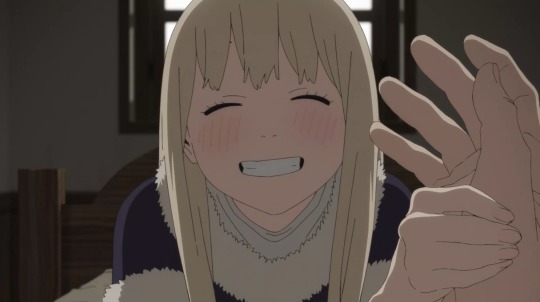
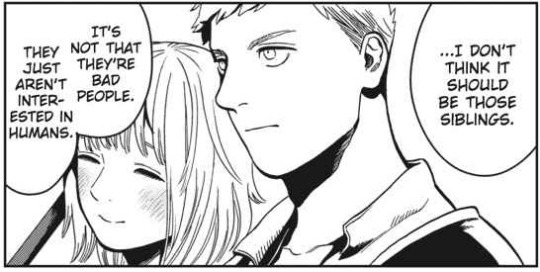
Been stewing on Falin thoughts for a while, I know I have an interpetation on her that differs from many but I’m jumping into the fray. I think there’s a lot to be said about what we do see of Falin. This shorter Falin analysis I made is heavily encouraged prior reading. This analysis mainly explores her complex relationship with caring and so it’s sort of structured in two halves, with Faligon at the crux of it all.
Falin cares too little :
A lot of people assign Falin a people pleasing mindset and I… Don’t agree. We never see her care at all about people in her town or at the academy not liking her.
We do see her worrying about what people think of her… ONCE. And Laios comforted her, told her they didn’t matter and she should be proud of herself. She latched onto that hard. That’s why this scene was so important to be included during the dragon fight, relationship-defining; it’s always been them against the world. She grew to not care what others thought, to only focus on her close loved ones. No one else matters.
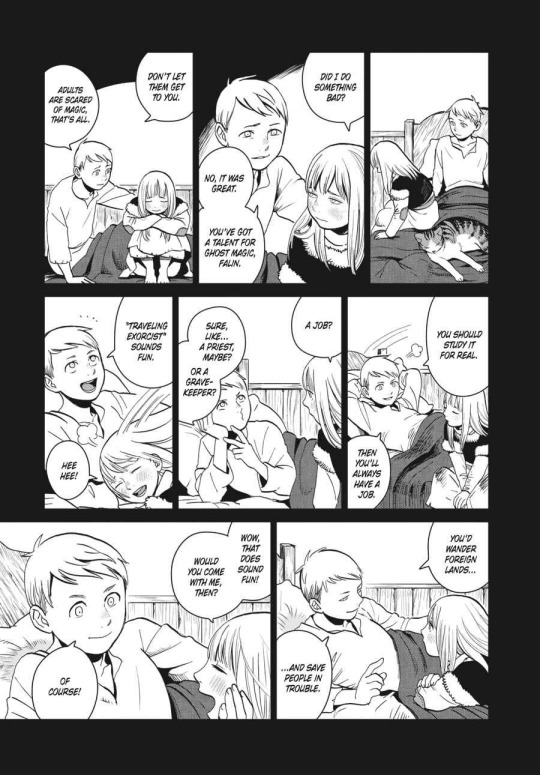
Laios’ words were her world. Her older brother who taught her how to feel comfortable with herself, who told her, you’re great, others are the ones in the wrong to not see that, I’ll always be with you, always be there for you. Older brother who always made great plans, who always knew more, who was better at wrestling to name the dogs, who she has always idolized. Laios who always spoke of traveling the world, to which she always said she wanted to follow. And she would, she’d follow him even if it meant leaving the academy and all she knew behind, she’d follow him to the ends of the world, and that’s what she did.
She didn’t care about showing to her classes or keeping up such appearances, she doesn’t even think of toning down her jumping into bushes when Marcille recoils, etc. She acts like an obedient pawn often, to her parent’s directives and then following Laios around no matter what he decides to do, but I don’t think the motivation is people pleasing, rather it’s being with & caring for her loved ones, and her go-with-the-flow attitude enhances the impression. Not that it’s as simple as that, mind you, but let’s talk about this for now.
Falin is perceived as selfless because we, the audience, have our perspectives revolving around the main people in her life (Laios, Marcille). They’re the ones she’s devoted to and people who care about her back a lot too, but to people like her classmates or the towspeople she probably must have seemed like someone who didn’t care about the people around her or her surroundings a lot, who just went on alone and did her own thing.
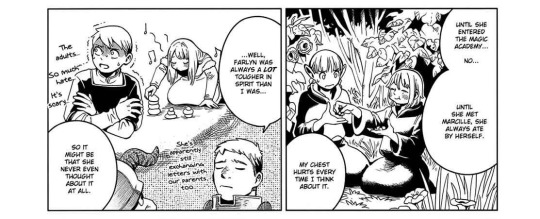
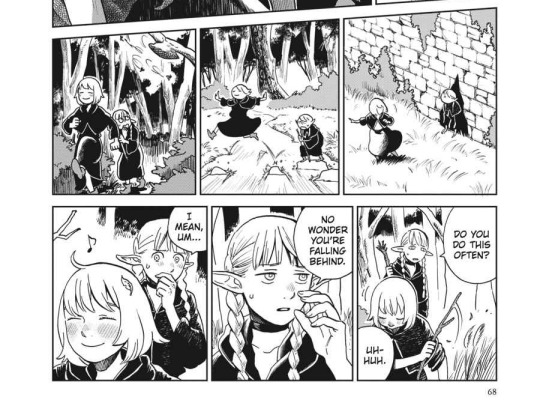
What matters to Falin? From what place does her kindness come from? Is a part of her keeping up appearances? And I think that’s the point, the horror of Faligon as well, that we can’t tell just how in control Falin the person is as the chimera (because we are shown that she’s in there, we just don’t know at what degree), that we don’t know her enough to be able to tell when she’s at her most genuine, her most raw. That even if you do settle on none of her being present as Faligon, we have to at least consider it, consider that she may be able to do something like this and have a part in it, brutal and uncaring. That even the lenses we see her through, the people who love her, may be unreliable.
And this is what’s very interesting about her too, she truly is so idealized by people around her as a saint. She’s so good and kind and caring to everyone etc etc etc. Laios, Toshiro and Marcille all see her as the paragon of goodness in the world. More cynical characters like Namari and Chilchuck have more layered opinions on her, the latter finding her somewhat unnerving because he can’t read her well. But then with that one flashback scene we see that… Her priorities are intensely focused on Laios and Marcille, she doesn’t care all that deeply about anyone other than them (+ maybe her parents). The rest of the party is in the same danger here but only Laios and Marcille who she’s speaking to get the special ,ention, and if they don’t cross her mind then of course she’d be ready to sacrifice strangers through a risky teleportation. That doesn’t make her not kind or caring!! Just that greater good isn’t exactly her priority. Any means is alright if the end result is her loved ones safe, it usually takes the form of healing and caring, but we see she’s ready to fight and make dangerous calls too. To me there’s this aspect to her that she isn’t as pure and magnanimous as everyone thinks she is, both in-world and interestingly enough meta wise as well, and there’s something interesting to that.
People pleasing implies a need to be liked, needs for the motivation to be that. A yes-man, etc. But if we analyze Falin, her general kind, smiling demeanor is more a matter of passivity I yhonk. Conflict avoidance is easier, so she’s friendly and hopefully things’ll be smooth sailing. It’s easy to be kind to classmates even if they act wary and rude if you don’t care about what they think either way. Of course she prefers good things happening to people over bad things, she is genuinely kind, but I think people tend to assign her a very grand altruistic way of life when to her the motivation is pretty self-centered. She doesn’t do what she does because she loves them, but because she loves them.
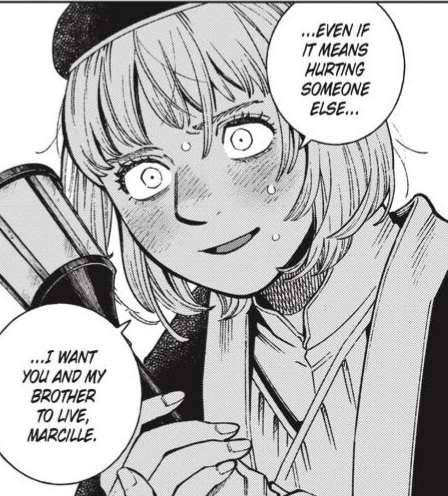
One situation that’s interesting to dig into for her way of thinking, and what I’m trying to get at, is Shuro’s proposal to her. I’ve seen people saying she hesitated because she didn’t feel comfortable saying no even though she wanted to, "I can’t say no, I don’t want to hurt him", something that sounds sensible and familiar, but it’s actually canon in the Adventurer’s Bible that the reverse was the case, that she didn’t feel comfortable saying yes. Because the offer was tempting, but it’d have been a loveless agreement on her end. And it makes sense she’d want to say yes too, like we see with the Toudens, marriage is very much a political strategical economical thing in their village, there’s even a bit on it on Laios’ Adventurer’s Bible profile about dowries, and both siblings were engaged very early. They lived poorly for a long time, it’s an enticing idea to marry rich, to have not only yours but your brother’s needs met forevermore easily, which at one point in their careers was their main worry and goal. Why shouldn’t she accept a life of leisure and wealth handed to her by a lovely friend?
So her hesitance was "yeah that’s convenient for me, but where it’s everything to him and heartfelt I’m able to be detached because I don’t care about it that much… Can I do that? I’m not reciprocating, not saying yes in the way that matters. Can I do that to him?" Very caring even though it’s not what you’d expect, isn’t it?
And central to my analysis, where I’m going with this is, I feel like that’s the thing with her character, that she doesn’t feel as strongly as she "should" sometimes, or feels a different way than she "should", or at least that she feels that way and others say she does. She didn’t mind suddenly leaving the academy, leaving Marcille behind and not seeing her for 4 years. She acted like it was no big deal that she sacrificed herself after getting resurrected after the red dragon fight. And in both those cases it upset the people around her greatly that she didn’t seem to get why it was such a big deal, didn’t seem to care about how they’d experienced her choices.
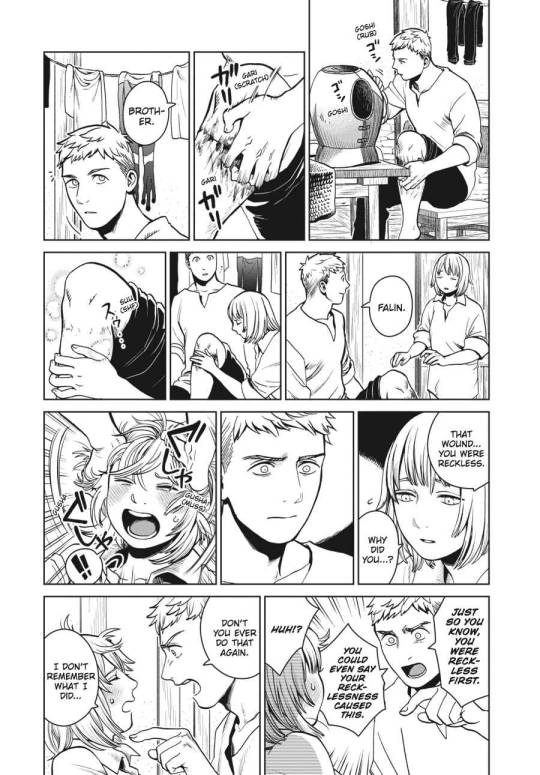
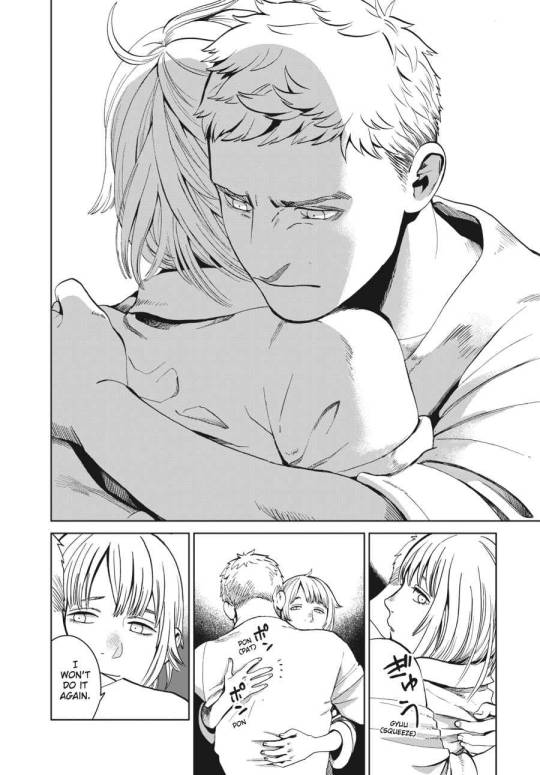
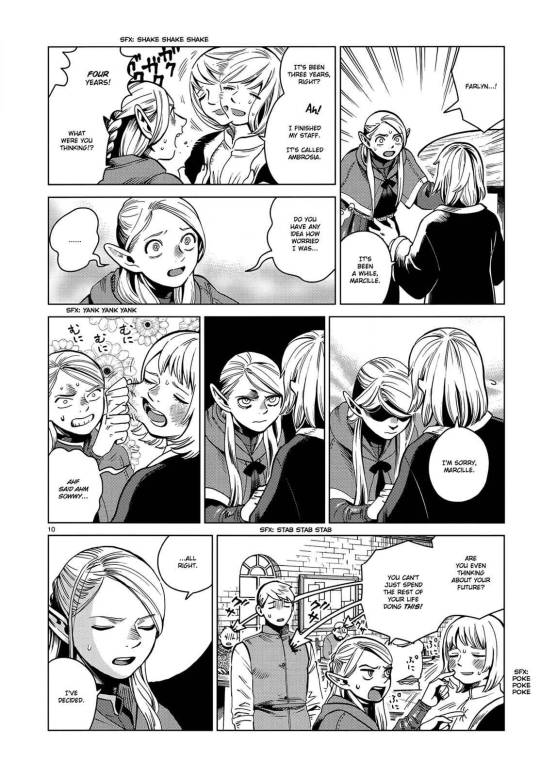
So it’s a tendency… And it’s not that she doesn’t care, it’s just that the way she measures what’s good for the ones she loves isn’t the same as what they themselves think it is (like Laios and Marcille not wanting to be apart from her). It’s an overt but quiet kind of care, it’s doing things like following them around and making sure they bathe and have a meal, even if that means she has to be dragged into misery too.
So yes she probably would know "not caring enough/the right way" is one of her perceived flaws, and that informs how she tries to handle her response to Shuro’s proposal. Her not wanting to accept like her first gut instinct, is because she’s thinking about reciprocity, about if it’d be right to go into this knowing that they have different priorities and she might not be able to keep up with the type and amount of emotions he wants/expects from her. And that’s a big part of her character isn’t it, having expectations pushed onto her. Her trying her best, but in her own way that may seem odd or even unfeeling. Not unlike when she exorcised the ghost as a kid too, unblinking and matter-of-factly, and not seeming to understand why people stared the way they did.
Even though she answered his proposal only post-canon, she’d been pondering it for a while even pre-canon and the Adventurer’s Bible explanation was released midstory, so I’m hesitant to assign her much growth about her hesitation and what I went on above, since she still didn’t react "right" with Laios after the red dragon fight (even if she apparently doesn’t remember sacrificing herself) and put herself in that situation in the first place. She hasn’t finished her arc on that flaw of hers is what I’m saying, she for sure still has it, but I certainly think her thoughts on Shuro’s proposal shows awareness, both of herself and social.
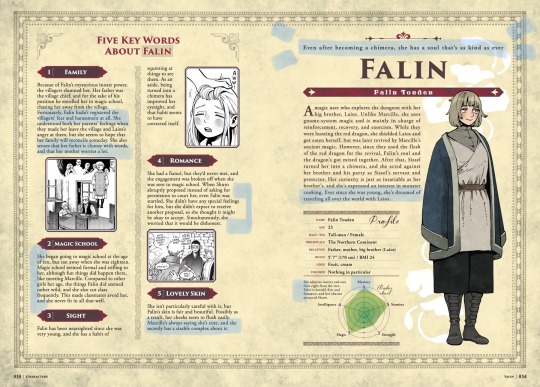
And awareness is a big analysis key word with Falin, especially here it can be hard not to conflate not caring with not knowing. How socially aware is she? It’s rather layered, because canonically she wasn’t aware of her ostracization in her hometown at all, and we’re not sure if she knew Shuro was interested in her before he proposed, but she generally seems more socially aware than Laios. She tags along on his caravan job to make sure he isn’t being mistreated (though doesn’t ask he get a salary), she catches social faux-pas more easily like in the genderbend magic mirror omake with Shuro, and interestingly enough she’s very good at empathizing with her parents and understanding their perspective. We see when she’s worried about Marcille coming that she does know about propriety and how appearances shape impressions. Being a chief’s daughter must at least have taught her a thing or two on that front.
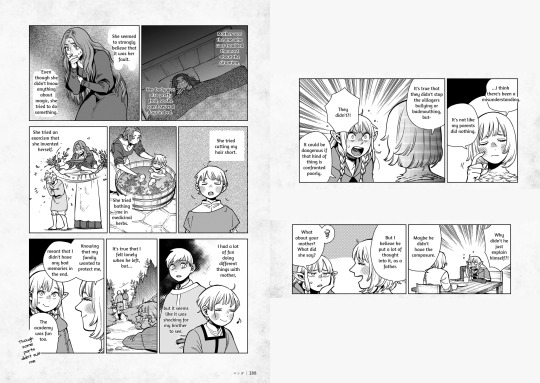
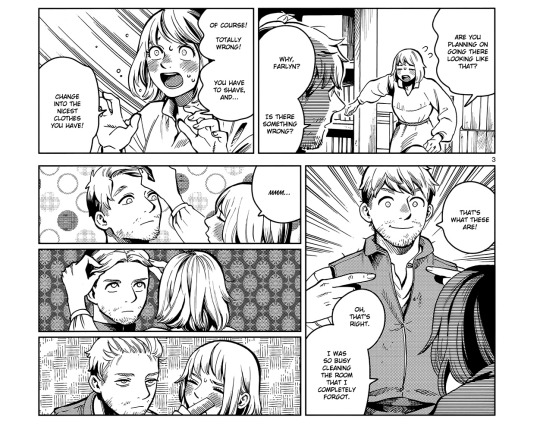
She never stands up for herself, but when it comes to defending others she worries, strategizes and explains.
And this sort of understanding is part of why I think she’d notice the expectations pushed onto her like I was saying earlier, notice how she makes people feel when she’s careless. But if she changes anything about herself in response to noticing is for her to choose, and generally I think it’s a sort of inbetween of yes and no: that she becomes more complacent but also more reserved, complying but by hiding more of herself passively. She’s not sure wether to accept or reject Shuro’s proposal, doesn’t want to lead him on? She’ll just be taking a while to silently consider it, try to keep things as they are for the time being. The third, less conflicting option. She doesn’t feel heard by Marcille who keeps infantilizing her? Just bear with it. Retract yourself emotionally. Settle for it.
We see that when she was young she had a tendency to not read a room, and I think that’s here too. She doesn’t get why her nonchalance upset others but that doesn’t change that she doesn’t want them upset or hurt, so she tries, albeit in maybe a roundabout way. She always had a hard time deeply connecting with people, often keeping herself some amount of emotionally distant: erasing herself from the equation, from the two-way trade that relationships are and making it a onesided thing instead, where all their needs and emotions are directed towards her but she only lets out a bit of her own show. She takes everything upon her and deals with it and tries not to give others this same burden, though not on a conscious level, it’s just that she’s learned growing up that she doesn’t have much agency.
Like I went into with my analysis linked at the beginning, I think Falin is used to just taking what she can get and not asking for more, when it comes to social bonds. She’ll take spending time with her mother no matter what it is they do, she’ll follow Laios to the graveyards and stick by him even when he’s pushing her away (because he doesn’t want her borrowing his book or "No copying!" or such). Her father was always distant, cold and uncommunicative, her mother was considered sick from anxiety and the exorcism attempts were the main way they spent time together, at dinner tables there were only her and Laios. The dogs picked on her too even if she loved them— And so did the townspeople, maybe that being normal to her at home is why she didn’t notice the ostracization she suffered.
She’s always been the last to be asked about decisions or what she wants, never asked to play with at recess, neither her father or Laios asked before sending her to the academy or leaving the village. At home, in the hierarchy she was considered to be below the dogs by the dogs themselves, as someone they can disrespect. Dogs learn from example and behavior, so this means Falin must have been pushed around a lot, and that the family didn’t try hard to rectify the dogs’ misconception, likely worsened by Laios regularly wrestling with her as a competition.
So for example when Falin showed Marcille food, it was her way to implicitly ask to have lunch with her without voicing that question, without daring to take up space. Someone’s presence isn’t something you ask for, it’s something that’s bestowed upon you, you can follow them around but you can’t ask them to stay or to come with.
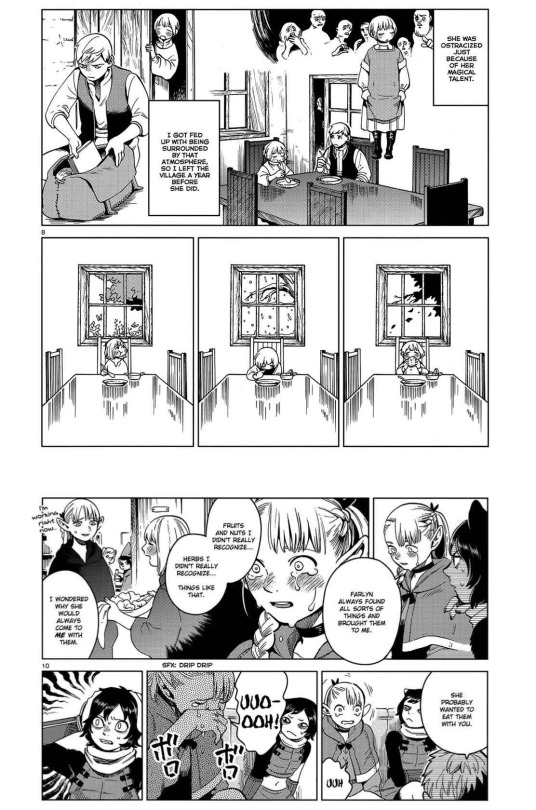
She’s used to her needs and wants not being listened to, so she’s learned to have less wants. Caring less about herself, caring less about other people beyond her safe zone, was a defense mechanism in part. She has a sense of learned helplessness too, like how when Marcille came to take her away from Laios, even though she didn’t want to leave with Marcille it felt so determined and unshakable to her that whatever Marcille decided Falin would have to comply with.
And still, it’s the "marrying you would be awfully convenient if it wasn’t that I’d feel guilty for not loving you back, the way you wanted me to when you proposed to me" and the "I don’t regret leaving the academy and leaving you behind without goodbyes but I’m sorry that you’re so much more upset about it than me". It’s the guilt of not loving people back the way they want to be, with the same intensity or fervor.
It’s the autism it’s the aroace of it all, it’s the emotional stunting and confusion but the pit in your stomach telling you you did something wrong again. The no object permanence even for people you love even for 4 years, it’s the feeling like you’re somehow at fault for someone having fallen for you and not knowing what to do with any of it. I’m not joking btw it isn’t uncommon for autistic people to not see their close friends for a long while, not having missed them all that much and for that to be really hurtful for the other if they notice/ask about it. "Hiii bestie! Oh umm you’re uh more emotional about this than I expected, hopefully you won’t feel alienated by me not feeling as intensely about it…"
So… Yeah. I think she thinks of things and relationships in a different way than most people, and beyond "good things happening to people is good" I don’t think she actually cares about people all that much. I’d argue that Laios shows more desire to connect with others and make relationships. And just like with Laios and his own issues with humans, that doesn’t mean her kindness is a lie or ungenuine or worthless! It just means that like, well it’s pretty straightforward really, she’s not all that social and doesn’t see casual bonds as meaning all that much and whatnot. She does want to see people happy, but it’s not as much like… A conviction or goal. She’s too laser focused on a select few people. "It’s not that they’re bad people, they just aren’t interested in humans."
And sometimes it feels like people get defensive about Falin in a meta way too, like if you ever so much as imply Marcille isn’t her whole world or that she isn’t the kindest soul out there then you’re saying she doesn’t care at all or she’s evil. And that’s actualy exactly the sort of vibe I wanted to get through with my analysis above here actually haha, that she does care and she is kind but it’s not in a way that’s quantified or understood in a way that makes people feel comfortable. In a way, that makes people feel insecure because they don’t have the same logic as her, don’t show love the same. And I think this is another stellar depiction of autism, of parts of it that feels unpalatable to many, if I’m making sense. The fandom idealizes her as well, which isn’t uncommon or surprising for the character embodying the trope of the perfect beloved to rescue.
And disclaimer, as I said in the tags I feel like the details of Falin are pretty vibe based when it comes to analysis, there’s absolutely a valid angle where she does super care about everyone always, feel free to disagree with me on the overarching angle of my analysis. There’s enough supporting evidence to tip the balance either way I think, and the reason I’ve chosen this angle is I feel it’s more compelling for the themes in Dunmeshi of idealization and being different, of desires vs wants, and because I think it neatly ties up Falin’s character arc as I’ll go over throughout the next section…
So.
Not feeling as much as she should. And……. Is this not Faligon pushed to the max?
You can’t tie down a dragon. As the chimera, she gets to just not care about everyone else and be on her merry way.
Part of it I think is finding comfort and freedom in the mindlessness, in not having the burden of feelings and connections and a consciousness (despite still ending up seeking those in a stranger, Thistle). Like when she’s dead in the purgatory as well, she gets to just… Hang around and do whatever. Similarly to when she played in the forest instead of going to class in her academy days. That’s what freedom and peace of mind looks like to her. Why she decides to roam post-canon, if only now with the goal to find herself instead, with her mind in tow and somewhere to go back home to.
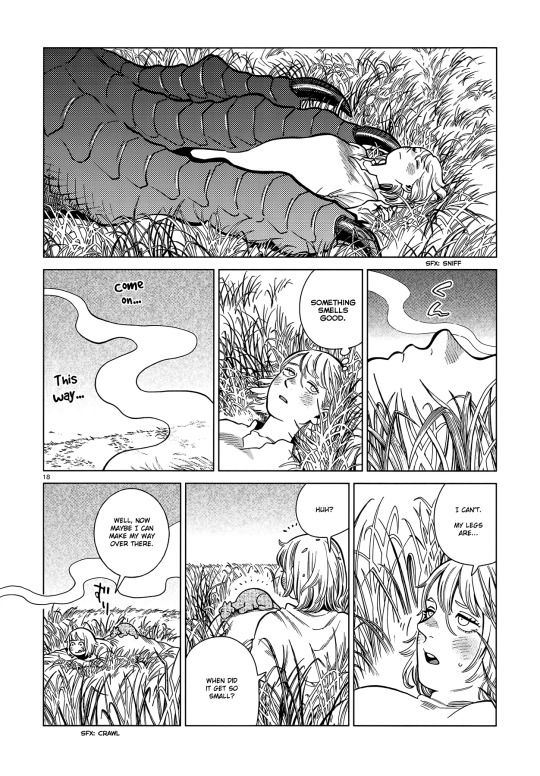
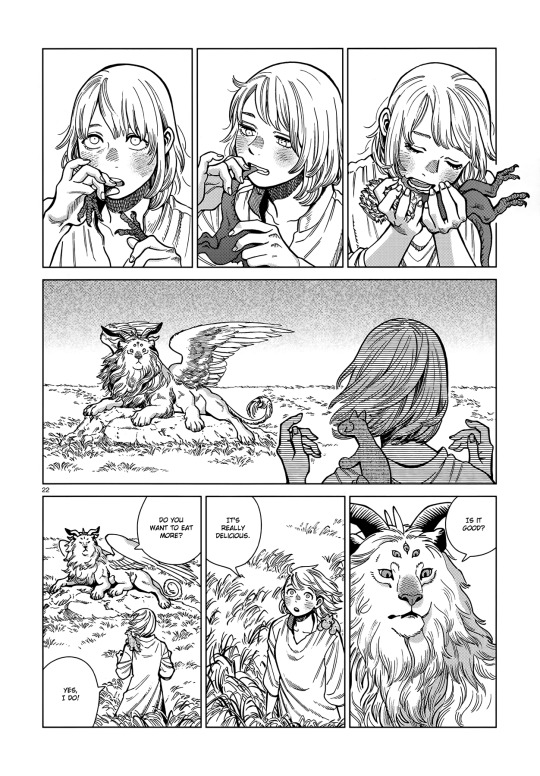
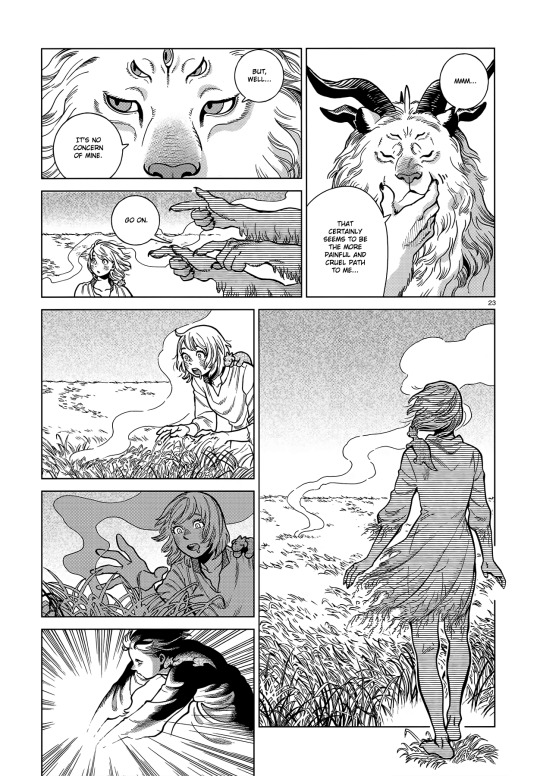
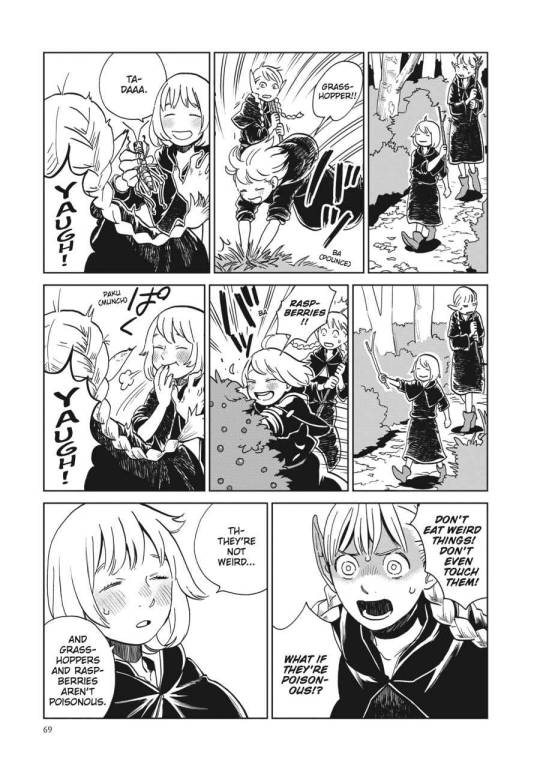
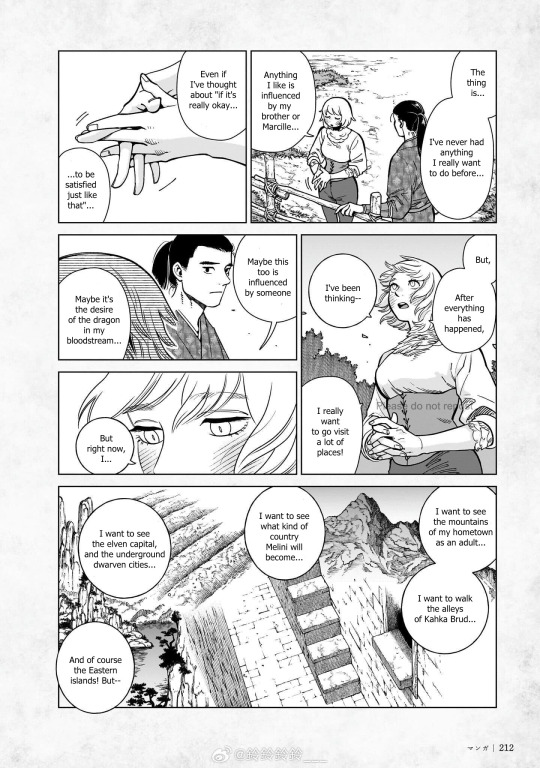
There’s excellent analytic framing out there about how of course, Dungeon Meshi has a big theme of grief and letting go, and… Falin was always a symbol narratively, idealized by characters and often underconsidered by them despite their love. It was Falin’s choice to sacrifice herself for Laios, she thought it was worth it, knowing that it would be her end. Her resurrection and the process of it intertwining her soul with a dragon’s wasn’t done with her consent, and the subsequent opening it gave her to become a chimera puppet. She’s stripped of her agency consistently, and so… It’s very noteworthy that the final choice, of wether to go back to life or to stay dead, in that purgatory scene, was up to her. And she chooses life, but I do think about her in those fields and how at home she seemed there. Peaceful, by herself in a vast calm expanse she could explore, free.
Personally, I think freedom is Falin’s own subconscious selfish desire. And though to us becoming the chimera is obviously a shackle, I think it felt like freedom to her somewhat, too.
And if you think I’m going wildly off the rails here I want to talk about Laios’ wish of becoming a monster. And to be clear before getting into it, being mentally a monster is absolutely a big part of the appeal for Laios, it’s something that’s consistently referred to, something especially pointed out in the werewolf monster tidbit with Lycion. Right panel is from that, but left panel is from the extra with Izutsumi where Lycion talks about suppressing souls in a beastkin body, the human or the beast soul.
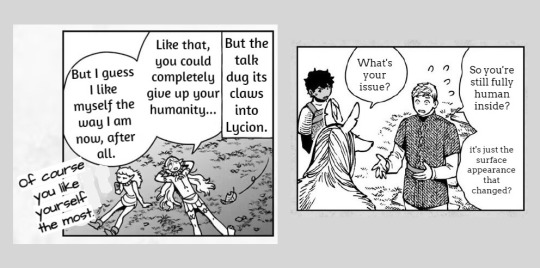
Finding comfort and freedom in being mindless, less sentient, less aware? While being unaware in her hometown might have saved Falin a lot of heartache although perhaps stunted her emotional growth, it’s always been Laios’ curse.
Actively, through his choices, he seeks to grow closer to people, to form deeper bonds, to understand and be undertood, but… On a deep seated level, what he desires is to leave humanity and civilization behind. He has an irrational hatred for humans, born from the trauma of ostracization, being different, being beaten up and rejected consistently through his life. Running away from problems is easier. He wants to be free from being a social animal from a social species who has deemed him the black sheep, he thinks it’d be simpler to just leave it all behind, people and his own humanity. At its core, to Laios becoming a monster is a power fantasy, a coping daydream of "if only I could be strong enough to never be hurt again, the power to destroy anything I want, the power to go somewhere better, if only it was possible for me to never feel hurt again. If only I could be someone, something, that can never be hurt". "If there’s someone you don’t like, you can gobble ‘em up in one bite. If you could fly, you’d be able to leave this village right now." It’s a childhood fantasy, from a deep sense of being misplaced and a desire to be able to stand fearless, thinly covering up resentment that Laios represses.
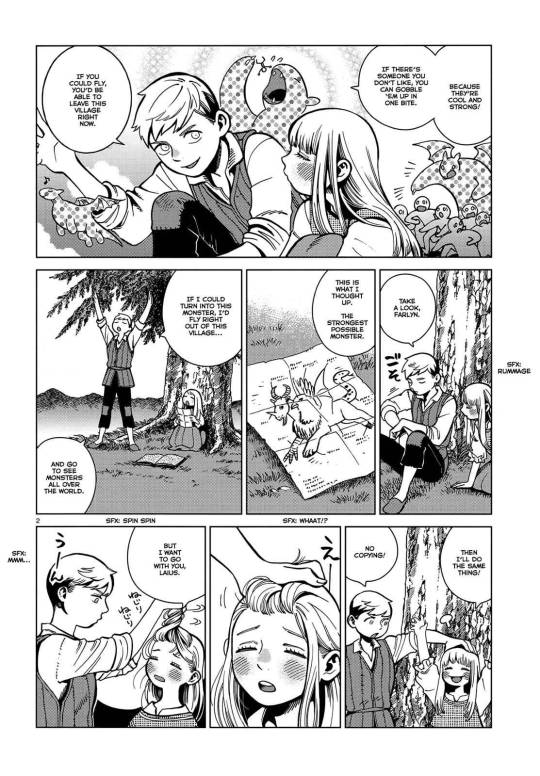
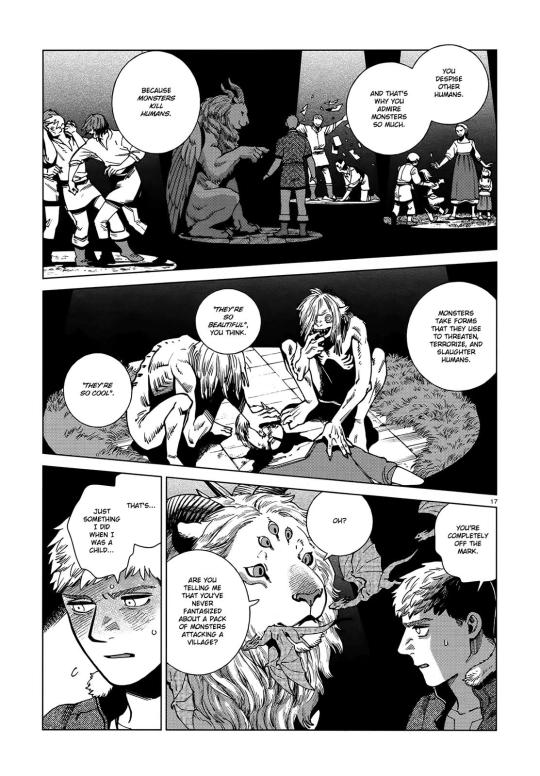
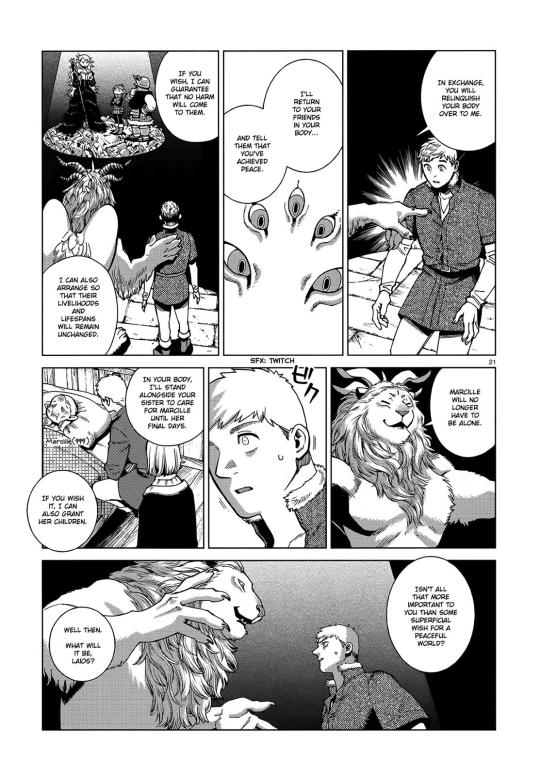
But you’ll notice, when the Winged Lion is enticing him in the last page, even now with his lifelong wish of becoming a monster on a silver plate, he still cares about his friends. He still has that sense of responsibility to his friends, doesn’t want to leave knowing they’ll be in danger and alone. The offer that his friends may be left unharmed is already good, but Laios also visibly flinches when the Winged Lion offers to specifically care after Marcille and rid her of her biggest fear. Laios’ care runs that deep. Not unlike with the succubus, he resists temptation until he gets reassured that everyone will be okay. But see, what he desires isn’t to stand alongside Marcille until her last days, it isn’t to stay and see how well his friends will live, it’s to go. It’s to leave. It’s to fly away, a monster both in body and mind. He wants to be free from caring here, wants to not have to worry about his friends, wants to just go do his own thing, but for that he needs to feel safe in the belief that said friends will be safe even without him being there to see it, because despite everything else he cares, he does. It’s again that dichotomy about caring and wishing you didn’t, or not caring and wishing you did.
In the end, it’s Falin who achieves that wish. Both by becoming a chimera during canon, and by going traveling post-canon. In the latter, being both free of human relationships as something chaining you while still being uplifted by them, by the knowledge that there are people out there you love and that love you. It’s a theme that can also be connected with Marcille, because she gets anxious over people she loves getting out of her sight, worrying they’ll get themselves killed, that time is passing while they’re away from her. But before she can get to the point where she can both have her freedom and being uplifted by her social bonds, regaining both her individuality and her connections, she has to get a taste of just one at a time. Before they can find balance in her life, she has to see what it’s like to have what she’s never had on its own. Unapologetic freedom, and power.
No one can blame you for not caring enough or caring right if you’re a fricking dragon!!!! You make the rules when you’re a beast and you can just… Fly away. From anywhere, from anything. And if a dog bites you you can just crush it. Instead of being pushed around by the dogs because you’re at the bottom of the hierarchy, you’re now at the top, the one with the power to be heard and do what you want without consequences.
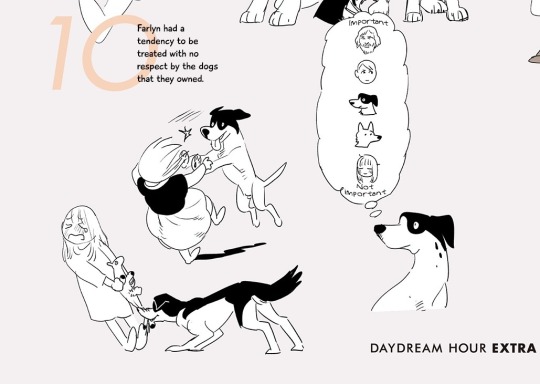
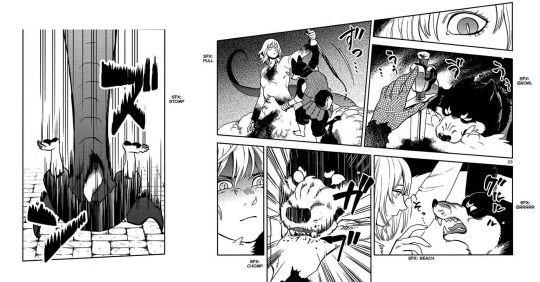
I think she’s on autopilot. I think she’s on autopilot a lot of the time, even before being a chimera, and it’s partly why her will is so weak compared to regular dragons. (Again, read my shorter analysis.) It’s familiar to slip back into the role of following someone around unquestioningly. And that’s what is weaponized when she’s a chimera, that instinct she’s been nursing all her life to unconditionally support, defend and follow someone. Only now, that someone doesn’t matter in itself, only the symbol of it. She doesn’t mind, either way is fine. Her will is weak after all, because she’s trained it to take as little place as it could.
Falin cares too much
She spends all her time caring for Laios and Marcille alternating that none of her care and emotional energy is left for others, including herself. So she had to get relieved of all of that for a bit, becoming the chimera so she could reset and recenter and remember that she, too, indeed, is there and an important part of her own life.
So you’re probably seeing the duality I’m talking about here, Falin is very self-sacrificial but for specific people in ways that they often don’t recognize or appreciate. She cares but selectively, both in people, putting all her eggs in the same baskets, and in the ways she cares after them. She doesn’t care a lot, but when she does she cares a lot. Falin doesn't have a lot of earthly attachments, but when she does, they're her world.
In canon her arc, especially post-canon, is to grow beyond Marcille and Laios. Her caring for her close loved ones held her back from looking after her own self-fulfillment needs. And this is what I mean when I say she cares too much; she could gain from caring more about the world besides Laios and Marcille, both lands wise and people wise. She cares too little, but her arc centers her flaw around caring too much instead. Her pitfalls that Kui highlight over the course of the story, while of course her selflessness is appreciated for how she saved Laios and everyone, on a personal level is shown to be self-effacing and damaging. She’s undermined by Marcille, without the courage to voice her thoughts and wants, she would dedicate her whole life to Laios. And I mean, it’s text, in the response to Shuro’s proposal extra no less. And she’s so laser focused on her most loved people that she’s fine with being callous and risking others’ lives, even.
Post-canon, she needs to leave to find herself, away from them.
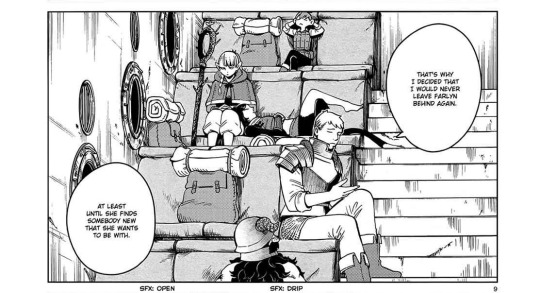
Herself. What if she wants to just be with herself for a while.
And this is me reaching but I feel like, not unlike Izutsumi who learns to feel this sense of never being alone, always having someone on your side what with having two souls, the dragon in her would make her consider herself more. She finds it easier to care after other people after all, and in the purgatory fields sequence she takes care to bring the bit of dragon left with her… Not unlike with Izutsumi, having two souls forces you to think about your identity and figure yourself out. Besides being this sort of duo now, where if she wants to care after herself she can channel it to that other side of her too… In meta dragons are symbols of greed, and I think the bit of dragon would push her to want more and listen more to her desires, primal and self-serving as they might be. The dragon soul which warped her human body with feathers and draconic features, her image of perfection marred, her weirdness externalized in a way that’s not palatable. But she doesn’t care, about if her appearance is palatable for most people, she hasn’t for a while now, and that’s great.
Notes & nuance
I’m struggling with the structure of this post, making my points organized, concise and strong at once. It’s difficult to make any statement without going "things are generally like this, but there’s this time that this contradicting thing happened too" or "it’s ambiguous enough that you should just follow my interpretation for the time of this analysis" haha, so this is the pit where I put all the stuff that wouldn’t fit well in other places but are interesting for Falin’s character. This section is pretty separate from the main thesis of the post, it’s just more Falin observations. The post has reached the 30 pics limit so I can’t just pull it up whenever it’s relevant but I really encourage scrolling up to read the stuff I highlighted in her Adventurer’s Bible profile if you haven’t already.
I think with the shy-looking loner type autistic kid archetype, and knowing she didn’t seem to mind others ostracizing her, it’s easy to lose sight of how she was by no means an unemotional child. In all the bits we see of her as a kid she’s bursting with energy and emotions. Canon confirms Laios leaving the village did affect her and make her lonely and she cried a lot, too. She may not be social in the traditional sense, but she was clingy with her brother, and she also never was all that shy about who she was, wearing her heart on her sleeve.And okay. Okay okay okay. Speaking of appearances. About what I said of her not caring about what people think of her, even seeming defiant with the caravan leader… There’s one istanxe of her caring actually, and it’s about how her face blushes easily. I remembered it as being because Laios’ said it and as I rambled Laios’ words are her world, but actually it’s ambiguous. It’s only Marcille imagining up this scenario where Laios says Falin looks weird because of it, there’s no evidence Laios said or thought that at any point. And on the other hand…
Her Adventurer’s Bible says: "5, Lovely Skin. She isn't particularly careful with it, but Falin's skin is fair and beautiful. Possibly as a result, her cheeks seem to flush easily. Marcille's always saying she's cute, and she secretly has a sizable complex about it." The phrasing makes me think the complex she has over her blushing might have developed because of Marcille more than Laios. "Marcille's always saying she's cute, and she secretly has a sizable complex about it." It could be related to how Marcille gets swept away and infantilizes her, calling her cute wanting her to wear cute feminine outfits etc. Again this feels like it relates to Falin’s struggle to be seen for who she is and what she wants to be seen as, her struggle to be recognized, having ideals and perspectives pushed onto her. Here Falin is insecure over her blushing implicitly because she doesn’t like being called cute over it, but that’s not how she wants people to see her. She doesn’t want Marcille to always see her as her 10 years old adorable friend. Like if your friend said you had puppy energy, it can be flattering, but it can also make you insecure.
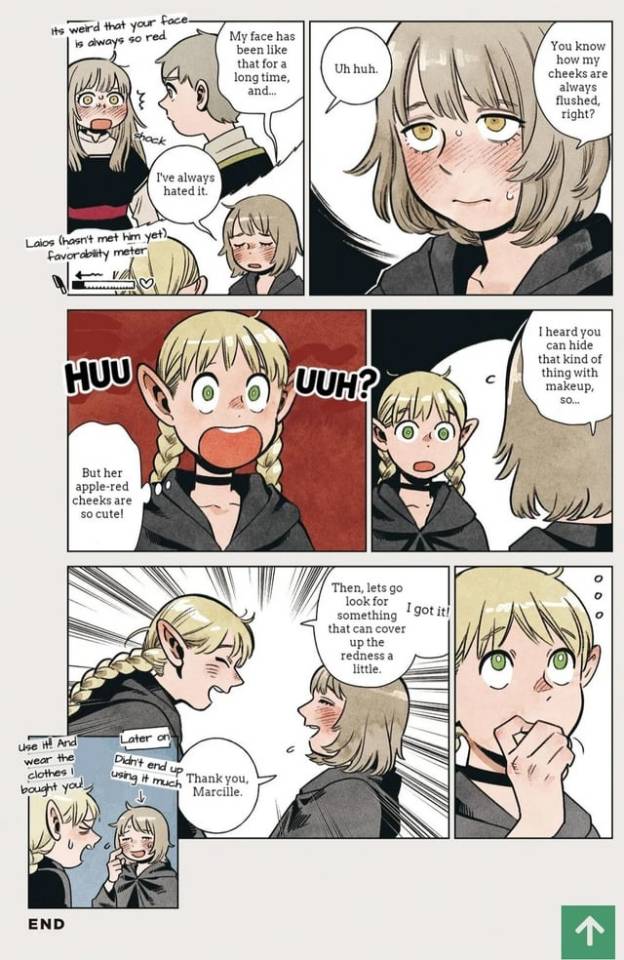
Here’s a link to what I mentioned about her being uncomfortable wearing feminine outfits. It does seem to be more about comfort than the aesthetic perse, to me. Interestingly the shirt & shorts don’t seem like they show much more skin than her beach outfit, so maybe it’s more about the shirt and shorts being tight-fitting. Like the skirts and heels they feel stifling. Again a bit with themes of freedom and not wanting an aesthetic pushed onto her. So yes just to reiterate, I think this is more about self-affirmation and how her identity and self-image gets shown to others, rather than wishing to hide parts of her body like her blushing etc for people pleasing reasons. Makeup was a way for her to appear how she wants to and feel more confident. It was a way to take control over her own image. She didn’t keep doing it, the narrator stating the process to be ‘troublesome’. Ultimately she still prioritizes her comfort, and it was a lot of recurring efforts to go through.
And on the topic of appearances… A friend once asked me: "Does she really hide herself or not? I keep thinking about "falin is herself first and foremost" (in her Adventurer’s Bible profile) it’s just so. Hmmmmmmmm... I just keep seeing people say she hides her real self from people when I feel like the issue is more about her charitable traits straying too far into becoming flaws but people around her dont realize that..."
Imo the thing is, I don’t think she hides her identity, but I do think she suppresses her individuality for others’ sakes if that makes sense. In the way that only post-canon does she allows herself to go see what the world is like, but that’s not personality wise it’s needs and wants wise. And I do feel like that’s the closest interpretation of canon, she says it herself she doesn’t know what she wants because everything she’s done was always about Laios or Marcille, but she doesn’t change her demeanor or personality for others. But she *will*, like, not ask for things she wants directly, like sharing lunches with Marcille at the academy, she suppresses her wants, doesn’t ask things from people and doesn’t hope for more, hope for better. I don’t think we ever see her actively repress her personality, except like what, being more laidback than enthusiastic but I do feel like unlike Laios with her it’s less ‘appearing stoic to fit in more’ and more ‘yeah i’ll just chill until I’m needed or something activates my enthusiasm’. To which said friend quoted: "to feel like you belong you need to be useful. when you can’t be useful the next best thing is being convenient."
And speaking of passivity… I want to speculate about Shuro’s proposal some more. Shuro and her got along well though we don’t know how much, or how often they hung out, she even saved him from a nightmare. Why did she take so long answering Shuro’s proposal? Was it an effort to preserve or was she really just that conflicted? Procrastination probably yes, but what is the core motivation of itl Considering she ended up saying no to travel the world instead, I don’t think it was as simple as ‘she wanted to say yes for convenience’. Logically it’s what would have been best, but it’s not what she wanted for herself, but it was and still is hard for her to even know what she wants. Probably, since like she states it was a great offer and she doesn’t think she’ll get proposed to again, it’s that self-effacing tendency that yes it’d be convenient and logical, and that makes her want to say yes even if her spirit isn’t in it, because if it’s convenient then that’s more important than her feelings on the matter. Man also… Obviously Marcille is very vocal about how she shouldn’t get with Shuro, but imagine how Falin’s whole perspective on marriage must have felt when her only friend ever is a Romantic with a capital R who gushes about idealized romances and grand gestures and True Love and doing things with fully pure feelings all the time.
AND speaking of passivity!!! How much Falin is "there" as the chimera, just how much she’s master of her actions, is left ambiguous and intentionally so imo, but she’s for sure there & influencing the dragon’s action to some degree. Having a dragon’s foot on her in purgatory that keeps her from moving for sure visualizes how it must have been like, but there’s Falin calling out to her brother Laios, there’s the kind attentions towards Thistle that are so Falin-like, and most explicitly there’s the Adventurer’s Bible stating "Even after becoming a chimera, she has a soul that's as kind as ever", which I honestly dislike, a fantranslation puts it as "Even as the chimera, her caring nature remains" and either way to me it feels like confirmation that it’s her giving those berries to Thistle. Now, wether or not she has the mental capacity of a chicken or something closer to human Falin, no clue, there has to at least be some kind of mind bond between monsters and the dungeon lord, compelling or forcing them to go along with orders, or calling her to him in distress like with the fight on the first floor. But yes, it’s interesting to wonder what it is that a Falin, with her kind soul but without her human mind, would willingly do. On her profile, she’s described as Thistle’s guardian and servant. The power dynamic between the two are very interesting, I already went into how it might have felt like freedom to her while being fake so I’ll reign myself in and just mention it again. She’s still at the heel of someone, only now it’s someone who doesn’t care about her back. Going from being cared for so strongly that it’s suffocating and they would defy death and the world for you, to being devoted to someone who has not one feeling about you besides your utility as a paw . She has all this care to give and to focus onto others and he has none to send back to her and I think that’s part of it. In a way, being left with only her own feelings and a void, without expectations or feelings or ideals pushed onto her, it might have been soothing in itself, and eye opening. But yes the way I think of it, her care for Thistle isn’t unlike the care she gives the ghosts.
Interestingly, the care she extends for the ghosts is sending their soul to a peaceful death, freeing them, of life and any earthly attachment. Take that as you will with the themes of freedom and burden of life and mind, immortality and becoming a warped version of who you were, and such and such.
But going back on the topic of connections and bonds for a bit, I think academy days Falin & Marcille is super interesting bc we’ve never really see Falin form a connection besides with Marcille and even that is kept pretty ambiguous. When was the point that Falin started seeing Marcille as a friend and seeking her out? When was the "I’ll lay down my life for you" point? I’m so fascinated by how she wanted to share lunches with Marcille but never truly asked, only made little "hey want this? I found it isn’t it cool?" gestures of showing things to her… It’s the only way she knows to ask, or maybe it’s the only way she feels comfortable to. In all the scenes of young Falin and Marcille Falin seems comfortable in her friendship with Marcille, but at the same time… I think we see Falin at her most insecure around Marcille, because she really does care about Marcille and what she thinks of her so much, and while Marcille is a bit of an unstoppable force tornado style (affectionate) Falin is something of a doormat. I’d usually say showing her berries was her earnest way to connect and be like "Hey bestie look at this! :]" , but there’s a real possibility that she was self-conscious and holding herself back.
Friendship and Marcille! Involving Laios into this too but, again with the autism thing of not showing you care in ways that others understand, Marcille being very overtly affectionate and clingy was so so soo important… Marcille keeping on hanging out with Falin and caring after her, and being undeterred/unbothered by Falin not always seeming like she cares all that much back in the conventional way, as in Falin acts nonchalant and a bit like she didn’t mind wether she was there with her or not during her outings to the cave dungeon. Caring and being clingy and so affectionate despite that in such a classic Marcille way is soo needed, because so often people will get discouraged by say, their friend not keeping in contact regularly/well, seeming disaffected or as happy-go-lucky as ever even if you haven’t seen each other in a while or when they’re alone, and yes there’s potential for a strong friendship there but someone like Falin won’t be committed enough to reciprocating attention the same way… I hope I’m making sense but yes this angle in particular strongly correlates to autism. And the way Marcille always initiates physical affection, both Toudens being awkward about initiating touch because they don’t know if that’s allowed, if they’re going about the social interaction the right way, if they’re allowed to ask that out of someone…
Another fun observation to make is about the 4 years Falin and Marcille spent apart. Marcille despite being of a long-lived race treated these 4 years of separation with more gravity than Falin did. Falin brushed it off very dismissively to say the least. But then you remember that the amount of time Falin and Laios didn’t see each other after he left the village was 8 years. Double the years, double the time. And that reminder makes Falin’s actions so starkingly understandable. Of course she wouldn’t see 4 years of separation as a long time if 8 years of separation with her beloved brother is her point of comparison. Of course she’d see it as worth it to leave Marcille for 4 years if it meant ending those 8 years instead, especially if she was worried about him (the reason why she followed him into his caravan job).
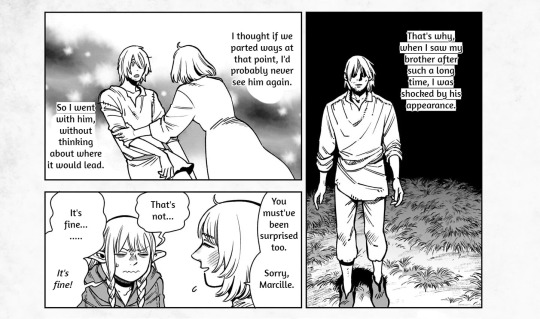
A friend always says that while Falin is the center of Marcille’s world, Laios’ is at the center of Falin’s, and I tend to agree.
It’s fun to think of how her career dreams had always been shaped by Laios, even when they were kids. Of course there’s how traveling the world began as a dream they talked about and shared, but there’s how he reassures her by listing cool jobs she could do like traveling exorcist, etc. And then of course, she gave up on her magic academy and career path to follow him and do odd jobs, etc etc.
I should go into the violence of Faligon more tbh, because I think there’s an interesting parallel to how she has no problem wacking things with a mace, wether a ghost when she was a kid or a walking mushroom as an adult. Something that often surprises fans when they remember, I don’t really want to get into the whole " Falin hates violence and hates seeing people in pain to an intense degree. ‘If you die do it somewhere where I can’t see’ style’ interpretation, it has some weight but on the whole I don’t vibe with the theory she has a particular aversion to violence, she seems to be fine resorting to it as much as any other adventurer as long as it isn’t needlessly against ghosts. And Falin’s sudden mace hits are fun to me too because it’s not her becoming a berserker when the need arises as much as her becoming active because something she cares about is threatened, and that brings her out of her passivity from 99% of the rest of the time. Thistle included. Falin always could be violent, she just dislikes senseless carnage. The Shuro party vs chimera fight is a bit ambiguous on it, because you can argue she only attached after being provoked, presumably offscreen as well while the ninjas went off to fight the harpies. Falin becomes the most active when she needs to protect someone, she has no qualms doing whatever’s needed for that, wether it be leaving the academy & Marcille without notice no matter the consequences or what her parents think, or teleporting the party, etc.
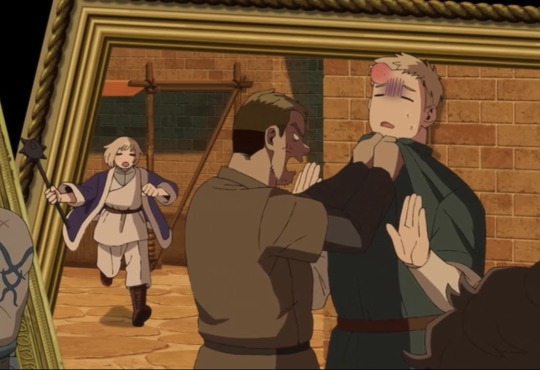
I’m working on a post specifically pointing out all the differences between Falin and Laios, but yes I think both of them selfishly desire freedom in different yet similar ways. Falin’s dark secret is "Ethics and risks are optional if it means I can protect those I love" like the teleportation, and Laios’ is "Ethics and risks are optional if I can be free of all this bullshit" aka humanity aka his wish with the winged lion.
Conclusion
Flighted birds have hollow bones. With freedom and wings there comes risks and sacrifices.
Tldr: Falin doesn’t care all that much, she’s very go with the flow. For example if someone hates her she doesn’t really care because that’d require her caring about what they think of her in the first place, and she only cares about her loved ones. She smiles, but it’s more a state of being rather than out of active goodness: she’s canonically very genuinely kind, but it’s more out of a general want for pleasantness than active care itself. She’s passive, and softspoken because that’s just how she seems, but she has no problem hopping into bushes or getting heated if something calls to her enthusiasm or calls for action and a hit of the ol’ mace. Her loved ones needing tending or protective is what makes her go from passive to active. That familiar autopilot mode of making someone the center of her world and following their every move is what made her so easy to be controlled as the chimera, even ferociously defending him with her life. Faligon is most interesting to me with the theme of freedom. She’s shackled to Thistle and out of her mind, but there’s also a sense of empowerment and freedom from expectations and society. She spends all her time caring for Laios and Marcille alternating that none of her care and emotional energy is left for others, including herself. So she had to get relieved of all of that for a bit, becoming the chimera so she could reset and recenter and remember that she, too, indeed, is there and an important part of her own life. There’s a way of caring after others that can be selfish, not unlike Marcille being overly coddling and not listening to Falin. In Falin’s case, I think it was so selfless that it ended up looping back around to erasing her sense of self. In losing sight of herself, that devotion becoming neither quite selfish or selfless but a fact of life and a state of nature, muddled by its lack of direction.
She’s sooo used to never being able to ask things out of others, you get the crumbs of affection and approval that others offer to you unprompted and that’s it don’t hope for more don’t ask for more. (Also reflected in how she follows her loved ones around without complain or personal opinions and how she’s not willing to rock the boat and affirm herself in her relationships like with Marcille during canon)
Falin cares so much, so much and so laser focused on her few loved ones that it blinds her and she loses sight of everything else, she ends up neglecting herself and the rest of the world. As Kui puts it, Falin is herself first and foremost. She just had to remember the importance of that.
-
I see her as an enneagram 9, which can be surprisingly accurate and fun to research through the lense of Falin. Excerpt below from this book, but like my god, good way to put it
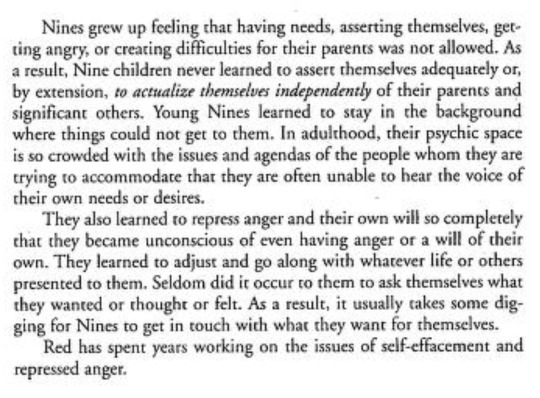
That’s it, ty for reading. Even if it’s a bit of a mess, hopefully you’ll have gained a thing or two from it. Falin is a character hard to pin down, but it is very gratifying when you find the way that the puzzle pieces fit together right for your own understanding of the story. Fantranslation of the shuro proposal comic by @/thatsmimi here.
Here’s my spotify playlist for her if you’d like
Sometimes love is about letting go, a lesson a lot of the cast needed to learn. Self-love’s important too, and just like with diets we need a healthy balance.
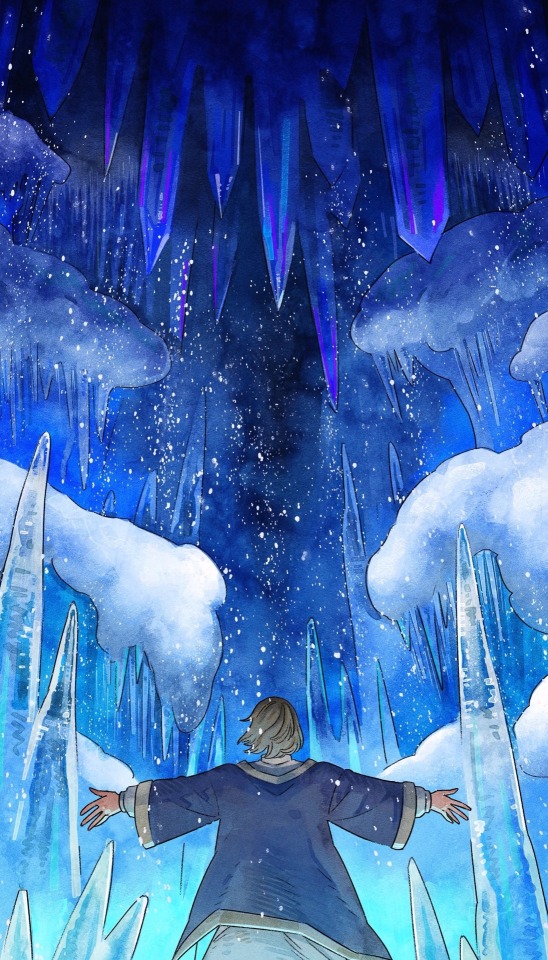
#I find it hard to express myself right on the topic of Falin. Both because the issue is pretty vibe based and because we don’t#get that many moments with her. So there’s ambiguous scenes up to interpretation addressing a layered topic and like. Save me. Save me#As always falling down the rabbithole of starting an analysis about a specific facet and then needing to explain everything else around it#I’m doomed. I’m getting lost in the sauce.#dungeon meshi#delicious in dungeon#falin touden#analysis#character analysis#meta#autistic reading#aroace reading as well. Sort of. It’s mentioned#The aroace autistic guilt of not caring back in the way/with the intensity you’re expected to#As always this is just my interpretation blablabla#Spoilers#dungeon meshi manga spoilers#She loves like a dog aka unconditionally and happy with eating scraps of affection and attention off the floor#Laios touden#he’s here too bc they are an unit#If you’re not capitalizing on the uncanny vibe autistic effect for Falin’s character u are missing an opportunity imo#Fairy’s child is written all over her. Her cryptic-ness is the point so why am I surprised she’s hard to fully pin down#Even with the graveyard scene it was Falin following Laios… Sob. Laios could feel responsible her powers were found out#I’d like to rework this at some point if i get better at structuring. I’m not satisfied by the level of clarity#Will 90% for sure edit stuff in if i find more to say.#Fumi rambles#Crazy style#I give a TLDR at the end if you’d prefer. It doesn’t have the like evidence/explanations alongside but it makes the main points i think
1K notes
·
View notes
Text
why was he so excited

he wanted to show off to pookie so bad

spot the difference 🤨
don’t even get me started on the angst potential of this 😿🙏
he was so happy before everything happened 🙁
#do you guys like my mediocre editing skills 🥺#bruhh someone give me ‘Erik is a happy bunny’ stuff i need this man to jump up and down from time to time#how tf do people write in depth analysis for these kinda things#cherik#erik lehnsherr#magneto#charles xavier#professor x#x men#wish does not shut up#xmen first class#xmcu
435 notes
·
View notes
Text
Evidence that Kabru from Delicious in Dungeon is Indian, a Masterpost
(EDIT: This post is an excerpt/remix of Kabru's section of my larger essay about the real world linguistic and cultural references Dungeon Meshi. You can read the essay on AO3 here. I also have another post about what part of South Asia I think Utaya is based on here.)
Since Kabru’s first appearance in the anime is upon us, I wanted to write something that compiles all the evidence we have that Kabru is meant to be a person of South or Central Asian ethnicity, or at least whatever the equivalent to that is in the Dungeon Meshi world.
Ryoko Kui can and does draw people of many different ethnicities, and the way she draws Kabru matches the way she draws other Asian characters in Dungeon Meshi. He doesn’t look Black, or Hispanic, or any other ethnicity because he isn’t supposed to. He looks like a dark-skinned South or Central Asian person, because that’s what Ryoko Kui probably intends him to be.
So let’s go through the evidence! (There are no spoilers for the plot of Dungeon Meshi below, but there ARE spoilers for Kabru's backstory as explained in the manga, and in extra materials like the Daydream Hour and Adventurer's Guide book.)
KABRU’S NAME
The Dungeon Meshi Adventurer's Bible tells us Kabru’s real name is unknown. There are other characters whose real names are only told to us in the Adventurer's Bible and were never revealed in the manga, but then Kabru, Thistle and Izutsumi’s entries simply say their real names are unknown, and though Kui could tell us their true names, she doesn’t. I assume this means that the characters themselves don’t know what their real names are, and that the names they go by are not their birth names, but this is only a supposition on my part.
KABRU THE MOUNTAIN
Kabru (काब्रु) is the name of a mountain on the border of Nepal and India, and part of the Himalayan range. It’s the 65th tallest mountain in the world and it is very snowy and icy, with frequent avalanches. Because of this, even though it’s not the tallest mountain in the world, climbing it is challenging, and is not often attempted. Those few that have managed to climb it consider it a major achievement.
“This prohibitively fearful icefall… had thwarted numerous expeditions, perhaps even the 'thought' of attempting the mountain… Unstable seracs of the icefall, a complex maze of chasms, and delicate snow bridges spanning seemingly never ending, near bottomless crevasses… Each time the members stepped into the icefall, they stood a good chance of never returning.” (Kabru - Mountain of the Gods, Major A. Abbey, Himalayan Journal 52, 1996, editor Harish Kapadia)
WHAT DOES KABRU’S NAME MEAN?
Kabru is a character that is known for being very good at charming people, but who doesn’t express himself honestly, because he’s trying to manipulate the people and situations around him in order to maintain control at all times. I think nobody really knows who Kabru is deep inside, maybe not even Kabru himself, so a remote, hostile, icy mountain that’s hard to climb seems like an extremely appropriate name.
Some of the oldest English sources I found regarding Kabru suggest that Kabru isn’t the correct local name for the mountain (a common problem in early Himalayan exploration by Europeans) and might just be a descriptor, or that it’s a misspelling.
This makes the name seem even more appropriate, since Kui’s told us Kabru’s true name is unknown. It’s possible that Kabru was a place-name or a descriptor that Milsiril (Kabru’s elven foster mother) was given when she picked up a traumatized 7 year old Kabru, and she just started using it as his name, and that even he doesn’t remember his real name thanks to his severe trauma.
The fact that people in the real world can’t seem to agree on the mountain Kabru’s name, or what it means, reminds me of the running gag of Laios repeatedly getting Kabru’s name wrong in the manga.
"All the people near the Kabru massif call it 'Kaboor'." (The Alpine Journal, 1921-22 Volume 34, Edited by George Yeld and J. P. Farrar) “It is also said that the name applies to a peak close to Kinchinjunga on the southeast, and not to the peak known to Europeans as Kabru… [The real name is] Pahung Ri [Pauhunri].” (Appendix I: Place Names in Darjeeling. The appendix says it was “compiled mainly from an article written by Colonel Waddell and published in the Journal of the Asiatic Society of Bengal (Vol. LX, part I, 1891)”) “Kangchen is a Tibetan name… the Sikkhimese use it as the name for the peak called Kabru by Europeans.” (Charles Bell, Dyhrenfurth's Himalaya (Berlin, 1931)) “...Kyabru or the horn of protection. The name is… Kabur… possibly a corruption of Kangbur or the swelling of snow; it might also mean the white swelling (kar-bur).” (Appendix I: Place Names in Darjeeling.) “Kabru literally means the 'White Avalanche' peak (Ka means 'white' and bru means 'avalanche').” (Kabru - Mountain of the Gods, Major A. Abbey, Himalayan Journal 52, 1996, editor Harish Kapadia)
I’ve seen one other mountaineering article cite the “white avalanche” meaning, and I think it’s plausible since the Appendix says it can mean “white swelling” or “swelling of snow”, which may very well be a literal translation for “white avalanche”.
WHAT ABOUT UTAYA? IS THAT INDIAN TOO?
Utaya means “raised” or “uplifted” in Hindi, but it’s also a real village and a Japanese boy’s name.
Utaya (ウタヤ) is the name of the village that Kabru was raised in before his mother died and he was adopted by the elf Milsiril. Utaya is located in the southeast of the Western Continent. It’s worth noting that Kabru probably wasn’t born in Utaya, since his mother had to flee from her home to keep Kabru alive, so Utaya may be some distance away from his birth place… Not so far that a woman with a newborn baby couldn’t survive the trip, but far enough that her husband’s family gave up on chasing her. So Kabru was probably born in a close-by area.
In the real world, Utaya (Yakut: Утайа) is in an extremely rural and isolated area with a population of less than a hundred people. It’s located in the Sakha Republic, which is in the Northeastern part of Asia in the Russian Federation. The Yakut/Sakha are a Siberian Turkic people.
The Turkic peoples are a collection of diverse ethnic groups of West, Central, East, and North Asia as well as parts of Europe, who speak Turkic languages.
Early and medieval Turkic groups exhibited a wide range of both East Asian and West-Eurasian physical appearances and genetic origins, in part through long-term contact with neighboring peoples such as Iranian, Mongolic, Tocharian, Uralic/Yeniseian peoples, and others. Turkic peoples share, to varying degrees, non-linguistic characteristics like cultural traits, ancestry from a common gene pool, and historical experiences.
JAPANESE MEANINGS FOR UTAYA
Utaya can be a Japanese boy’s name with several different meanings, depending on which kanji it’s spelled with. In most of the spellings: Poetry, sing a poem, singing, compose poetry
In many of the spellings: The place where the sun shines, it's been a long time, distant, big, to shoot with a bow, to swear, affirmation, question.
The Utaya disaster happened a long time ago.
If Utaya is up in the mountains above the clouds it’s a place where the sun shines brightly.
Kabru has sworn to himself that he will prevent another Utaya tragedy from happening.
In only a few of the spellings: to mend, feathers, wings, a word for counting birds and rabbits, sort them out, washing with water to separate the good from the bad, roof, house with a roof, a world covered with a big sky, infinite space, song that praises the Buddha, Eight.
Counting birds and rabbits makes me think of divination and also that the people of Utaya were like little birds and rabbits (small prey animals) to the monsters that devoured them.
Separating the good and the bad could hint to the “judgment” of Utaya and the greed of its people that led to their downfall, also sorting through things to separate good and bad is something that’s done with food and other resources.
The Himalayan region is often referred to as the “roof of the world”, with a big open sky above it.
The infinite could refer to the dimension the demon comes from, or to the sky above the mountains.
Buddhism is a common religion in the Himalayan region, and eight has auspicious connotations in Buddhism.
With all that in mind, Utaya as a name for Kabru’s home village is an interesting choice, and adds another layer to his origins, maybe suggesting not just North Indian/Himalayan, but Central or North Asian cultural influence as well.
It is also possible that the name is just telling us that Utaya is “up” in the mountains, or that it was “uplifted” by the wealth of the dungeon, or even that Kabru was “raised” there… The Japanese name meanings are also extremely fascinating and hint at similar ideas, as well as the tragedy that happened to Utaya.
WHY ELSE DO YOU THINK KABRU AND UTAYA ARE HIMALAYAN?
In the real world, the Himalayan mountain range is an extremely popular tourist destination, and the amount of people who want to visit and attempt to climb the mountains far outpaces the local ability to support it. This makes me think of the dungeon of Utaya and how people overcrowded it in their desire to conquer and exploit it.
Dungeons as an unsustainable way for locals to make a living that leads to the destruction of their homes when the dungeon inevitably collapses is a major plot point in Dungeon Meshi, so I think the parallel is likely intentional. Characters often talk about someone “conquering” the dungeon, and “conquer” is also the terminology commonly used for climbing a mountain. This terminology obviously has a hostile, imperialist subtext in the real world, since it’s most commonly used by outsiders talking about proving their strength by climbing a mountain.
Also, there are local legends in the areas surrounding Mt. Kabru that there is a valley of immortality hidden on its slopes, which reminds me of the way that the dungeons can grant conditional immortality to the people inside of them.
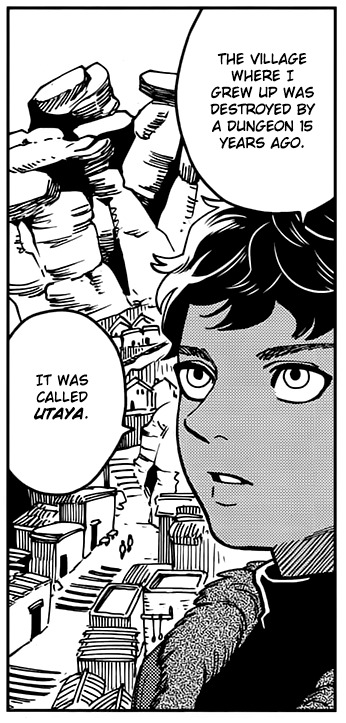
This image of Utaya could be showing us a village built on a mountainside. The house shapes seem a bit more Middle Eastern than Nepali/Indian, but it’s not a detailed drawing and the roof styles are a mix of flat and peaked.
CULTURE
In the Daydream Hour sketchbook, Ryoko Kui included a small comic about characters sharing desserts from their home countries. A young Kabru is shown enthusiastically trying to share an unnamed sweet, and he is interrupted by his elven foster mother, who insists he present a type of elven cake instead. We know that Kabru hates this type of cake, and he seems disappointed to have to eat it and talk about it.
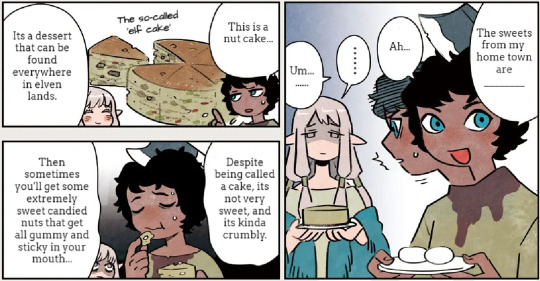
The white balls in Kabru’s dessert are very likely meant to be an Indian sweet called rasgulla (literally "syrup filled ball"). Rasgulla are a dessert popular in the eastern part of South Asia, made from ball-shaped dumplings of chhena dough, cooked in light sugar syrup. While it is near-universally agreed upon that the dessert originated in the eastern Indian subcontinent, the exact origin is disputed. Rasgulla are as culturally important to the Bengal and Odisha regions of India as Parmesan cheese is to the region of Parma in Italy.
Rasgulla are also popular in Nepal, where they are called rasbari.
KABRU’S PHYSICAL APPEARANCE

Kabru is one of several characters in Dungeon Meshi with clearly non-European features: he has brown skin and thick black/dark brown curly hair. He has almond-shaped eyes with long, dark lashes (fans like to joke that he’s wearing eyeliner). All of these are traits common to people from the Indian subcontinent. His blue eyes are not common for someone with his skin/hair color, but blue or green eyes are not unheard of in that region either.
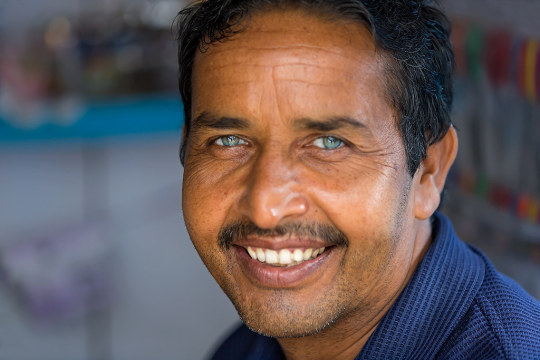
(Indian man with blue eyes)
Blue or light eyes are often a cause for discrimination, like what Kabru experienced as a child. More on this in a moment.
Kabru is 5’7” (170cm) tall, which is short for a Northern European man (180), tall for a Nepali man (162cm), but close to the average height of Indian men (177cm). He has a slender build, which is also common for Asian people in general, and South Asian men in particular.

Compared to the European-looking tall-men in Dungeon Meshi (such as Laios, Falin, Delgal, Marcille’s father), Kabru’s facial features look more like the other Asian characters, such as Toshiro and his party.
CAN DARK-SKINNED PEOPLE HAVE BLUE EYES?
Yes. Light-colored eyes are very uncommon in parts of the world where most people have dark eyes, since dark eyes are a dominant trait in real-world human beings. That means that in order for two parents with dark eyes to have a child with light eyes, both parents need to have a recessive light-eyes gene (or for there to be an illness or genetic mutation), and that’s rare in populations that don’t have a lot of light-eyed people to begin with.
THEN WHY DO SO MANY DARK-SKINNED CHARACTERS HAVE BLUE EYES?
Anime and manga often give characters with dark skin light colored eyes instead of allowing them to have brown or black eyes, which is much more common in real life. It’s a hurtful design trope that makes many readers feel that their natural dark eyes are somehow ugly or inferior to blue eyes.
This trope is used over and over again by authors who want their characters to look “cool” and ���exotic”, and for their eyes to be high-contrast to make it easier to show their emotions.
I don’t think this is what Ryoko Kui is doing in Dungeon Meshi.
UNREALISTIC HAIR AND EYE COLOR COMBOS IN ANIME
In a lot of anime/manga, blue eyes (regardless of skin color) don’t actually mean anything in the narrative, in the same way characters having green or pink hair doesn’t mean anything, the colors are non-diegetic, they don’t actually exist in the world, like the music that plays in the background without an on-screen source.
It’s an artistic shorthand to make characters visually stand out, instead of giving them all black hair and eyes like most real-life Japanese people… Which is what most anime/manga characters are meant to be: Japanese people.
Dungeon Meshi has a large cast of characters that are explicitly meant to be non-Japanese. We know this because there’s a group of characters that are Japanese, and they’re drawn differently from everyone else, they wear ethnically Japanese clothing, and have ethnically Japanese names.
Unlike other series, where eye and hair color don’t mean anything, Dungeon Meshi has no unrealistic skin, hair, or eye color combinations.
(Except for the elves, who seem to have different genetics than real world-humans. I’ll get into that another time.)
Ryoko Kui must be aware of the dark skin, blue-eyes design trope, because if she gave Kabru blue eyes just because she thought it looked good, surely she would have made some of the other Asian or dark-skinned characters have light eyes. Out of 9 Asian or dark-skinned tall-man characters, Kabru is the only one with blue eyes.
Kabru having light-colored eyes is central to his story, and Kui talks about it.
KABRU’S STORY AND WHY HIS BLUE EYES MATTER
Kabru’s father and his family tried to kill Kabru when he was born because he had blue eyes. Kabru’s mother ran away, and ended up raising Kabru by herself in Utaya. She didn’t try to return home to her own birth family, but instead struggled to raise a child completely on her own with no money or support, which implies she had no other options, due to the fear people of their region have for people with blue eyes.
This is a real thing that used to happen frequently in areas where most of the population has dark eyes, and it still happens to this day.
In a realistic story, this is logically what would happen to a character with dark skin born with blue eyes in a place like the Utaya region. It’s rare for manga or anime to show dark-skinned blue-eyed characters facing this.
WHAT IS THE “EVIL EYE”?
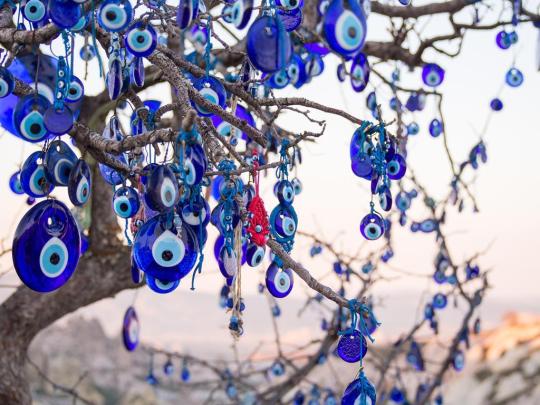
The “evil eye” is a supernatural belief in a curse brought about by a person looking at you. The belief in the evil eye has existed since prehistory, as long as 5,000 years ago. It is estimated that around 40% of the modern world's population believes in the evil eye. This concept is most common across the Mediterranean, the Balkans, the Middle East, and Central and South Asia, areas where light-colored eyes are uncommon.
In areas where light-colored eyes are rare, people with green eyes, and especially blue eyes, are thought to bestow the curse, intentionally or unintentionally. Just one look from a blue-eyed person is often considered enough to inflict a curse.
One of the most famous and widespread talismans against the evil eye is the nazar, a glass amulet featuring concentric circles in dark blue, white, light blue and black. It’s supposed to “bounce” the curse away from the wearer.
HOW DOES THIS APPLY TO KABRU?
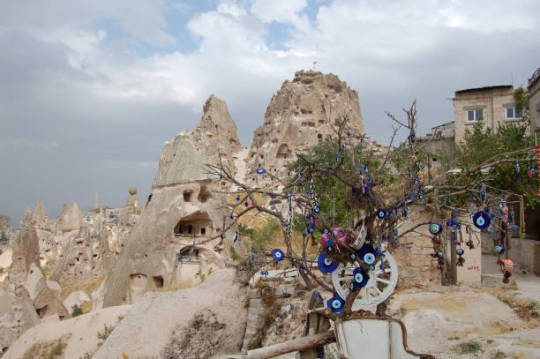
Imagine Kabru growing up in a village surrounded by people wearing and hanging talismans that look like his eyes, because the people around him think blue eyes are evil. They call his mother a witch for birthing him, and a whore because she doesn’t have a husband. Imagine parents forbidding their children from playing with or even talking to Kabru. People crossing the street to get away from him, or chasing him away by throwing rocks.
I think the reason young Kabru was able to learn how to speak some kobold is likely because he was so heavily ostracized by the other tall-men around him, the only children he could occasionally interact with in Utaya were kobolds, who might not share the same cultural superstitions that the tall-man do.
This childhood trauma, combined with Kabru’s experience of the dungeon collapse in Utaya, and being raised by an elf that treated him more like a pet than a human being, set Kabru up as a character who has never had a home where he belongs. He has been an outsider from the instant he was born, and every place he has lived treats him as an “other.”
To his father’s family, he was a curse. To his mother, although she loved him, he was a burden. To the people of Utaya, he was a monster. To the elves, he’s a tall-man baby (no matter how old he gets) with funny looking eyes, to the people on Merini Island, he’s a foreigner from the West with elven ways and education.
CONCLUSION
I wanted to write this because I know some people will see Kabru in the anime for the first time today and think "Oh, another dark skinned blue eyed character! This is a bad character design that is evidence that the author is racist at worst or ignorant at best.” And I don’t think that’s a fair assessment of Ryoko Kui’s work in Dungeon Meshi.
This isn’t to say that Ryoko Kui has never done anything wrong, or that her work couldn’t be more inclusive, or that there’s no way in which she could improve.
But there are pages and pages of artwork she’s done that shows she cares about these issues, and I think it’s worth celebrating when someone makes that kind of effort with their artwork.
ANYWAY…
If you’ve read this far, you’re very strong hahaha. I hope you enjoyed this essay. I’ll be publishing more soon when I finish my Dungeon Meshi research on the names and cultures of all the characters. Wish me luck!
#dungeon meshi#delicious in dungeon#dunmeshi#kabru#my stuff#analysis#character of color#theories#Dungeon Meshi Research
2K notes
·
View notes
Text
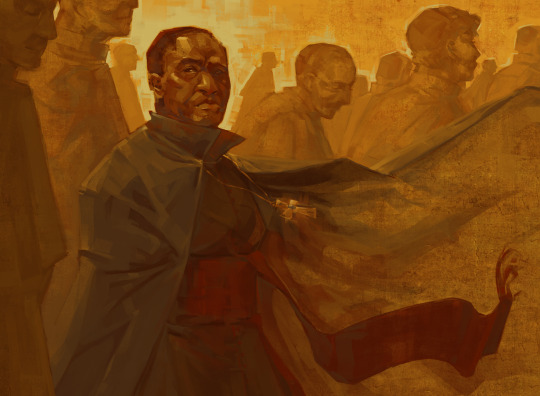
what will it take to be more than just a man
#jamtam(fan)art#jamtams art#conclave fanart#joshua adeyemi#cardinal adeyemi#planning on doing a companion piece#w similar comp and pose but w tedesco's entrance to the conclave#and tedescos cape lol#i think its a fun little detail that those two are the only cardinals in that scene that are wearing any garb like that#the scene is meant to be rainy and cold so i get it. i Think adeyemis covering is meant to by a raincoat type thing. but also.#if i wanna reach and make up things i think it could allude to their political likemindedness#ive seen ppl make analysis posts on tedescos outfit n just thought about how adeyemi also strays from the crowd#though he is more subtle- he blends in more while still being distinct#i ramble about this sorta stuff all the time on my twt alt im just too shy to write anything srsly in public posts LOL
254 notes
·
View notes